Esmée Fairbairn Foundation Annual Report and Accounts 2022

































The Foundation is one of the largest independent funders in the UK. Last year we made grants of £36.2m towards a wide range of work in support of our aims: A Fairer Future; Creative, Confident Communities; and Our Natural World. We also have a £45m allocation to social investments for organisations with the aim of creating social impact. Our funds are generated by our investment portfolio, from which we aim to achieve a total return of RPI plus 4% on a rolling five-year average.
A Fairer Future
Creative, Confident Communities
Our Natural World
Fairbairn Foundation aims to improve our natural world, secure a fairer future, and strengthen the bonds in communities in the UK.
We do this by contributing all that we can to unlock change by people and organisations with brilliant ideas who share our goals.



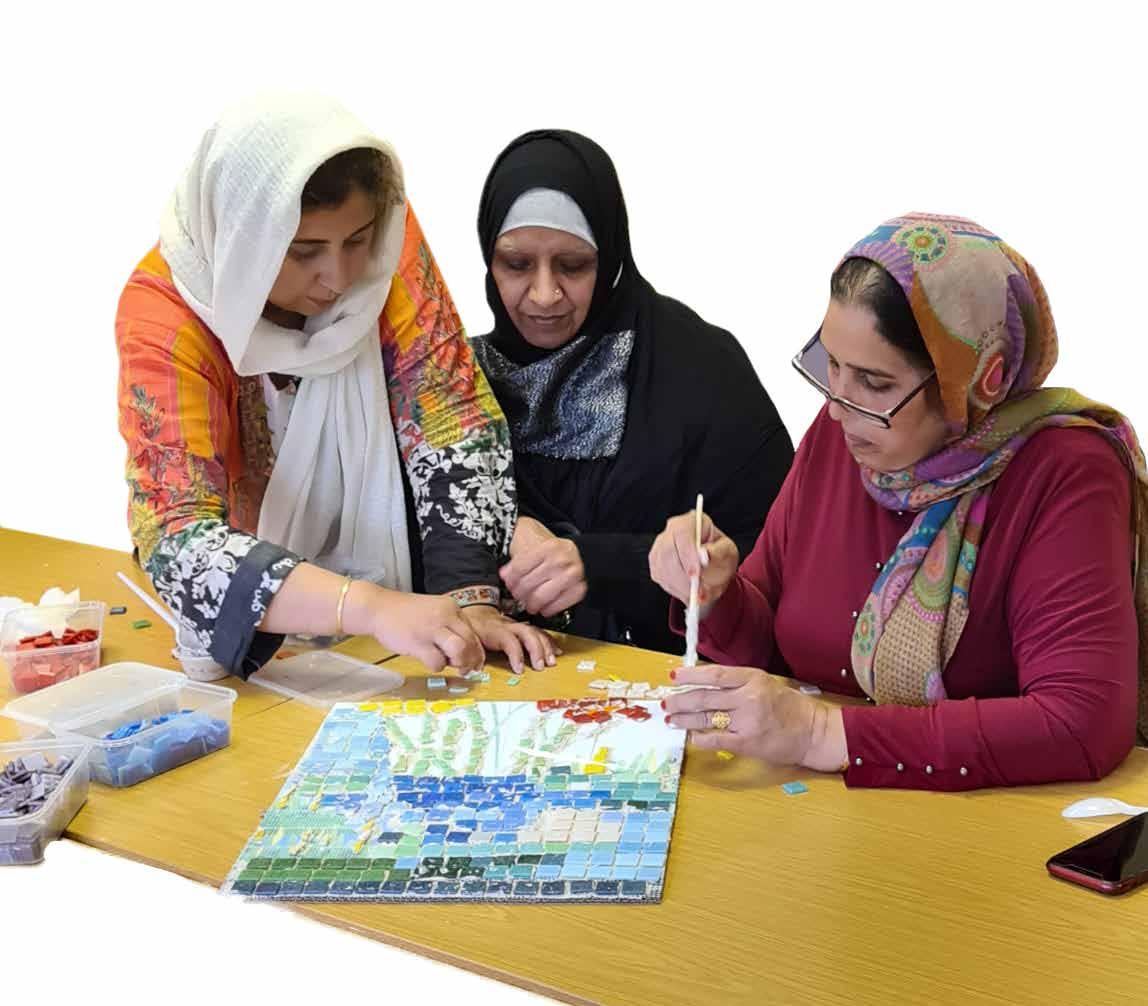
“This project (Northern Roots) is simply amazing. What a vision for a community space, it will create such a vibrant energy for our town!”
Oldham resident
“I want Northern Roots to inspire other towns across the world”
In my first statement as Chair I want to reflect on all that has been achieved in a demanding year by the Charities and other partners which Esmée Fairbairn Foundation has been privileged to support. I am heartened by their unwavering dedication to creating long-lasting change whilst navigating existing and emerging challenges.
As well as being a funder, Esmée Fairbairn Foundation is an investor. It is with pride that I think about how this aspect of the Foundation’s role has evolved over recent years. A great deal of work has gone into reviewing our investment strategy and developing a sustainable investment model. I am grateful to everyone who has been involved in this ongoing transition.

In December 2022, we were deeply saddened to learn of the death of Baroness Veronica Linklater, who served as Trustee from 1990 to 2013. She played
a critical role in shaping our work across a number of areas. Her contribution included chairing the Foundation’s £4.0m Rethinking Crime and Punishment programme, which funded 57 projects over its life and whose work continues to have lessons for prison reform today.
I would like to pay tribute to my predecessor, Sir Jonathan Philips, who took on the role of Chair during an especially difficult period for the Foundation, steering us through with great empathy and leadership. I feel privileged to be following in his footsteps and I am grateful to all my fellow Trustees for their ongoing guidance. I also want to thank the Executive team for their commitment to implementing our new strategy and their thoughtfulness around the ways Esmée Fairbairn Foundation continually strives to be a better funder.
I want to give special thanks to Sharon Shea and Laurence Scott, who are both leaving after over 20 years’ service. They have made a remarkable contribution to the Foundation’s work and will be hugely missed.
Over the coming year, alongside our partners, we will review the ambitious goals that we have set in our new strategy and approach. This will provide a valuable opportunity to reflect on the progress made, the challenges we have encountered, and the lessons we have learned.

When times are difficult and uncertain, what is the role of independent funders? At Esmée Fairbairn Foundation, we think it’s important to keep pushing for change for the future. The pandemic, rising cost of living, and the climate crisis are compounding long-standing problems for people and nature across the world. In the UK, the organisations Esmée funds have continued to respond and adapt to these crises, and in 2022 our Trustees decided to provide £7.4m1 in additional support to help them address the root causes of problems, so they don’t happen again, as well as to reimagine and build a better future.
2022 has been a year of transition and transformation for Esmée. When we first launched our strategy in 2020, we knew there could not be a return to business as usual, and that we needed to take time to determine what role we should play.
We temporarily closed to applications in A Fairer Future as we completed the development of our strategy, identifying five priority areas. We had to make some difficult choices, but we believe that by narrowing our focus, we can make a deeper and lasting impact. We’re grateful to everyone for their patience, and to all those who gave their valuable insights as part of the process.
During the year, we provided £36.2m2 (2021: £51.5m) in grant funding to over 1803 incredible organisations who share our goals. 64% of main grants awarded were for core or unrestricted costs. In addition, we committed £2.7m in social investments to 4 organisations and made our first impact investment to the Green Generation Fund, which invests into companies delivering solutions for more sustainable, healthy and ethical consumption.
In total, we also approved £743k through our dedicated Tools budget, which we use for activities where we are taking a more active role. Most of it was used for influencing work towards building the Our Natural World roadmap of activities , the Learning Programme supporting our Young People Leaving Care funding, and
to develop our work with our Involving Young People Collective. Through Funding Plus, we made 72 small grants, totalling £490k, 86% of which was used for individual consultancy on areas including business planning and to develop diversity, equity and inclusion plans.
1 This funding was offered to most organisations we fund as a Cost of Living Uplift payment, and was awarded in January 2023.
2 Includes all grants (main grants, Funding Plus, exceptional grants and TASK grants).
3 Excludes organisations awarded a Funding Plus, exceptional or TASK grant.
With weaker financial markets as a result of high inflation and other events, our endowment was down by 9.6% to £1.3bn. Following a commitment to a net zero carbon strategy for our investment portfolio, we increased our allocation to enhanced ESG investing to 5% (around £70.0m) of the overall fund. Our Trustees also agreed to update our investment approach to support a transition to sustainable investing.
Having been one of the founding signatories of the Funder Commitment on Climate Change, we’re excited that, in 2022, the initiative reached the milestone of 100 foundations in the UK committed to addressing the causes and impacts of climate change.
We know there is much that needs to change within the funding sector to ensure we contribute as effectively and equitably as we can to the challenges we face. We’re pleased to be working alongside other funders and partners to improve the sector’s practice – including our own.
We’re grateful to initiatives including IVAR’s Open and Trusting Grant-making, the DEI Data Standard and the Foundation Practice Rating for providing opportunities for us to reflect on our practice. In response to these, and to applicant perception research we commissioned and other feedback we have gathered, we have been able to take action in some areas. For instance, we started collecting diversity data from applicants and organisations we fund
so that we can better understand who our funding is reaching and identify inequity in our funding.
Looking ahead to 2023, we are determined to use every resource that we have to push for change and are excited to work with so many of you in making that change a reality.
Dame Caroline Mason CBE Chief Executive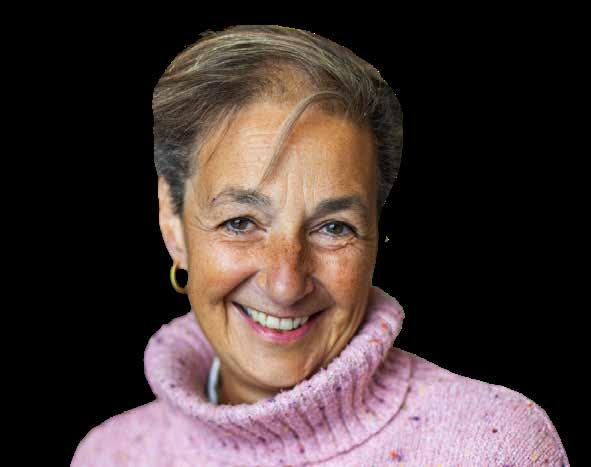
Total grant funding
During 2022, the Foundation approved £40.6m on work towards a wide range of work in support of our strategic aims to secure a fairer future; strengthen the bonds of communities in the UK; and improve our natural world. This includes £490k through our Funding Plus support and £743k approved for Tools.
The majority of our funding in 2022 was distributed through grants. We also committed £2.7m in social investments, and £1m in impact investments.
Total number of grants made4
£36.2m 188
Social investment (committed to)
Endowment total
Impact investment (committed to)
4 Excludes Funding Plus, Task grants and exceptional grants.
£1.3bn £2.7m £1.0m
4 Excludes Funding Plus, TASK grants and exceptional grants.
Impact goals by 2030
Improved systems, policy and practice
Aims
A Fairer Future
This report reflects how our funding fits our strategy, which we updated in July 2022 following a review of our strategy for A Fairer Future.
Some of our funding supports work across more than one aim, impact goal and priority. We have chosen to reflect grants and social investments in line with the aim, impact goal and priority that is the closest fit. In some cases, a priority under a different aim may be the best fit.
We also support key infrastructure organisations and new ideas that contribute to our impact goals across our aims by enabling a stronger, inclusive and innovative sector. Work that meets this description is shown in A Sector Fit for the Future.
A Sector Fit for the Future
Creative, Confident Communities
Organisations are strengthened to use their power to tackle systemic injustice and inequity
Priorities in the first 5 years
Arts and creativity making change
Children and young people’s rights
Gender justice
Organisations work together and build movements to tackle systemic injustice and inequity
Migrant justice
Racial justice
Communities use their power to make change happen
Culture and creativity build thriving communities
Local economies work better for the people who live there
Clean and healthy freshwater
Communities working together for change
Community-led art and creativity
Community driven enterprise and regeneration
Freshwater
Peat
Our Natural World is protected, restored, and improved
Preserved and improved species health and habitats
Space for nature
Fishing in tandem with nature
Nature friendly farming
Sustainable and ethical food
We make unrestricted, core and project grants for charitable work in the UK. Grants are listed under our three main aims as well as A Sector Fit for the Future on pages 16 to 46. In addition to our main grants, Trustees also approved a small number of exceptional grants, which are listed on page 51.
We provide social investment in the form of different types of repayable finance to charities and other social purpose organisations with the aim of creating social impact. Investments are listed under our three main aims as well as A Sector Fit for the Future on pages 27, 35 and 44.
We also made 5 social investmentrelated grants totalling £284,000, which are included in the overall figures for grants. Learn more about how we use social investment as a tool on page 12.
We want to be at the forefront of new approaches to funding –working in partnership with other funders and organisations to increase our reach, reduce duplication, and make more of a difference. This includes working with partners on a range of delegated funds.
Delegated grants are listed on pages 47 to 48.
of Special Knowledge)
£1.1m Total 2022
122 – No. of grants
Each Trustee has an annual TASK budget of £90k to be used for small grants within the charitable purposes of the Foundation. In addition to these, in 2022, Trustees approved a number of exceptional grants.
Grants are listed on pages 49 to 51.
We invest into impact funds, which align with our impact goals and aim to generate a measurable social or environmental impact as well as a financial return.
5 Social Investments are referred to as Programme Related Investments in the Trustees Report.
6 Impact Investments are referred to as Mixed Motive Investments in the Trustees Report.
Social Investment (committed) by aim:
Investments are listed on page 44.
7 Excludes Funding Plus, TASK grants and exceptional grants
8 Active Portfolio as of 31 December 2022
Total eligible expressions of interests decided: 779
% of all expressions of interest invited to full proposal: 19.5%
% of ‘cold’10 expressions of interest invited to full proposal:
4.4%
Success rate for ‘cold’10 applications after submitting a full proposal11: 70%
Operations
Number of staff at Esmée: 38
Staff Cost: £2.6m
188 grants to 180 organisations.
39 grants (21%) were to organisations we haven’t funded previously
28 grants(15%) were from ‘cold’10 applications
810 active grants as of 31 December 2022
9 Doesn’t include withdrawn applications.
10 Cold’ applications do not include follow-on grants or those we have proactively invited.
11 Includes applications that were first submitted in 2021 as an expression of interest.
12 E xcludes Funding Plus, TASK grants and exceptional grants.
In addition to grants, social investments and our endowment, we use a range of tools to support activities where we are taking a more active role – for instance, through convening or commissioning research.
In 2022, we approved £743k on Tools. Influencing and codesign work accounted for 50% of the spend. In Our Natural World, this work included support for a campaign to secure the legal ban of peat in horticultural products across the UK nations, and support for developing innovative investment models to fund the restoration of nature in the UK.
In A Fairer Future, we used our Tools spend to expand and develop our work with our Involving Young People Collective(£126k), which will include a small participatory grant-making fund; and work with an alliance of partners to create infrastructure needed for youth
organising and youth-led change (£60K) in the UK. The latter forms part of the legacy of the Act for Change Fund, a £3.6m partnership with Paul Hamlyn Foundation, which supported 32 youth-led organisations between 2018 and 2022.
The largest commission (£50k) made within the area of research
and evidence in 2022, was for a county-wide feasibility study into the provision of co-ordinated advice to farmers to accelerate a wider transition to sustainable methods of farming. The findings of this research will enable us to formulate a strategic response to the advice needs of farming practitioners.
In 2022, we spent £490k through Funding Plus. Most of this was in response to individual consultancy support requests from organisations we fund (65 grants totalling £421k), with the remainder in tailored training and peer learning opportunities.
Funding Plus continued to meet the broad and diverse needs of our funded organisations. Over 40% of consultancy support focused on business planning and strategic development. 17% was used to further diversity, equity and inclusion ambitions ranging from communications support for a museum decolonisation project to support museums to develop and implement ant-racist protocols and practices.
Other consultancy work included a digital transformation project, feasibility studies, accessibility audits, and legal training.
Our tailored Funding Plus training programme supported our environmental and racial justice commitments. Climate action training attracted 52 participants
from 34 funded organisations, and a project to develop trauma informed practice, a growing area of awareness and concern among organisations we fund was successfully piloted. We also piloted a new peer learning platform supporting 23 senior leaders to build confidence and capacity to think, lead and collaborate systemically.
“We’ve found the [Funding Plus] process to be a wholly supportive one, and one that allowed us to get on with the work without a significant administrative burden. We’re very grateful for the support, and want to acknowledge the uniqueness and importance of such opportunities to ‘follow the wind’ and build on areas of interest when they present themselves.”
We believe that social investment is a powerful and financially sustainable tool, which we can use to help achieve our impact goals whilst also supporting the development of the social investment market and increasing the total amount of funding available.

Our approach to social investment focuses on three objectives:
• Investing for impact: starting with the social need and reverse engineer our investment approach
• Influencing: to enable a broader, more accessible and innovative social investment market
• Learning and sharing: for a more strategic portfolio and to establish greater collective impact
This has resulted in an investment portfolio containing many different investment types, including a Land Purchase Facility and a range of Quasi Equity products.
groups, which we will be implementing in 2023 and beyond.”

Repowering

Community Shares £120k
Social Investment (SI) by type £34.2m
Total Active Portfolio (AP)
74 No. of SI’s AP
Commitments
£2.7m – Total 2022
4 – No. of SI’s 2022
Total AP
1 No. of SI’s AP £0 – Total 2022 0 – No. of SI’s 2022
Quasi Equity £1.1m
Total AP
6 No. of SI’s AP £400k – Total 2022
1 – No. of SI’s 2022
“With support from Esmée Fairbairn Foundation and Trust for London, we have been developing an innovative bridging finance tool that will make delivery of community energy projects more accessible for community
London
We invest in order to finance our charitable work.
We aim to grow our investments by UK inflation (RPI) plus 4% to support our charitable work and to ensure we can continue contributing towards our aims for decades to come. We use a range of sustainable investment approaches with different financial and impact goals to support our work.
£40m
Spent towards our impact goals.
Our Board of Trustees regularly review our funding budget – balancing the need now with the likely need in future. Our budget is linked to the value of our endowment: we spend around 4% (£40£50m) on grants and operational costs. To account for volatility in the market, we calculate the 4% based on the performance of our investments over the previous five years.
£45m
Allocation towards our impact goals, whilst also supporting the development of the social investment market. Our approach is impactfirst, financial returns are secondary.
£10m
Allocation to test the potential to achieve market-like returns by investing into impact funds which align with our impact goals, and which generate a measurable impact. In 2022, we made our first impact investment to Green Generation Fund, who invest into companies which deliver solutions for more sustainable, healthy and ethical consumption.
5%
Allocation for funds looking to achieve enhanced environmental, social and governance impact alongside financial return. It supports funds which wouldn’t normally make it into our main portfolio due to their small size, focus or risk profile.
£1.2bn
We work with our advisors to identify funds which focus on sustainable investing and have steadily increased the proportion we would classify as best-inclass managers. As well as targeting net zero carbon in the portfolio by 2040, our Trustees have now agreed a sustainable approach across the whole portfolio.
Since 2016, we have been involved in a number of collaborations, with other investors, looking for opportunities to influence and promote corporate behaviour which aligns with our strategic priorities, and is in the interests of longterm shareholders. In 2022, this included an initiative encouraging companies in the food sector to reduce environmental risks associated with manufacturing facilities and a joint letter to European banks asking them to end funding for fossil fuel projects.
We are committed to social justice, and to tackling injustice and inequality. We believe that understanding and making progress towards diversity, equity and inclusion (DEI) is critical to our mission.
You can learn more about our progress and actions we have taken towards DEI on our website.
At the end of 2022, we shared our initial analysis of data gathered about who our funding is reaching and who is applying for our support to help us identify structural inequity in our funding practice. Using the DEI Data Standard , we focused on population groups that face structural inequity because of their identity.
Read our report: Who our funding is reaching.
The following chart reflects data we gathered about the communities our funding supports and the leadership11 of the organisations we funded in 2022. The chart focuses on population groups most relevant to our strategy and includes data on 165 (86%) main grants and social investments made in 202213 .
We want to build on this work and welcome feedback, which you can email to: communications@ esmeefairbairn.org.uk .
We’re also keen to encourage other funders to collect and share their funding data.
13 The data doesn’t include Funding Plus, TASK grants and exceptional grants.
In everything we do, we are committed to addressing the causes and impacts of Climate Change.
In 2022, our funding towards our goals in Our Natural World as well as work to address climate change totalled £16.8m14 In addition to funding in our priorities for Our Natural World, this includes work that contributes to our priorities in Creative, Confident Communities – for example: supporting communities to plan and lead on effective place-led action on the climate crisis, and an investment to triple London’s community-owned renewable energy assets over the next five years. The total includes grants, social and impact investments, as well as support through Funding Plus and our Tools budget.
We continue to look for opportunities to support a fairer and just environment movement. During the year, we focused on a range of activities including:
• Our Environmental Finance and Learning Fund , a joint initiative with the Environmental Funders Network (EFN) to help unlock significant new funding for nature recovery, got underway. The Fund closed on 31 March 2022, and raised a total of £679k from 15 individuals and donors. With Esmée’s matched funding, the Fund has a total of £2.7m to deploy in environmental investments over the next three years.
• In a joint initiative with NatureScot and the National Lottery Fund, we launched the Investment Ready Nature Scotland Scheme for pioneering nature restoration projects. Seven projects were awarded a total of £580k for work ranging from exploring urban flood management in Glasgow to creating a natural capital laboratory at Tarras Valley Nature Reserve.
• We are supporting the People’s Plan for Nature an initiative led by RSPB, WWF-UK and National Trust, to create a shared vision for nature in the UK. The process for developing the plan involved 30,000 contributions from the public and brought together 100 people from all walks of life in the UK to agree a shared vision on how to renew and protect nature.
• We are supporting several initiatives to improve the racial diversity of the environment sector including:
– The development of the RACE Report , which launched their inaugural report in 2022. Led by SOS-UK, Hindu Climate Action, Nature Youth Connection and Education, and South Asians for Sustainability, it is a reporting initiative to help tackle the lack of racial diversity in environmental organisations.

– Chartered Institute of Ecology and Environmental Management (CIEEM) to deliver Green Jobs for Nature to create a more diverse and inclusive workforce to deliver the jobs needed for nature’s recovery.
• We took the decision to increase the size of our allocation in our endowment from £25.0m to ESG investing to 5% (approximately £70.0m) over time.
• To support our commitment that our investment portfolio will be net zero in terms of carbon emissions by 2040 at the latest, we contacted all our investment managers to let them know our position. Our investment advisors will also be collecting annual information from them to track their progress on net zero alignment.
Learn more about the actions we have taken over the last year.
We are a founder signatory to the Funder Commitment on Climate Change.
As such, we commit to:
1. Educate and learn
2. Commit resources
3. Integrate
4. Steward our investments for a post-carbon future
5. Decarbonise our operations
6. Report on progress

14 This total includes relevant funding listed in our aim for Creative, Confident Communities, TASK and exceptional grants, as well as Funding Plus,
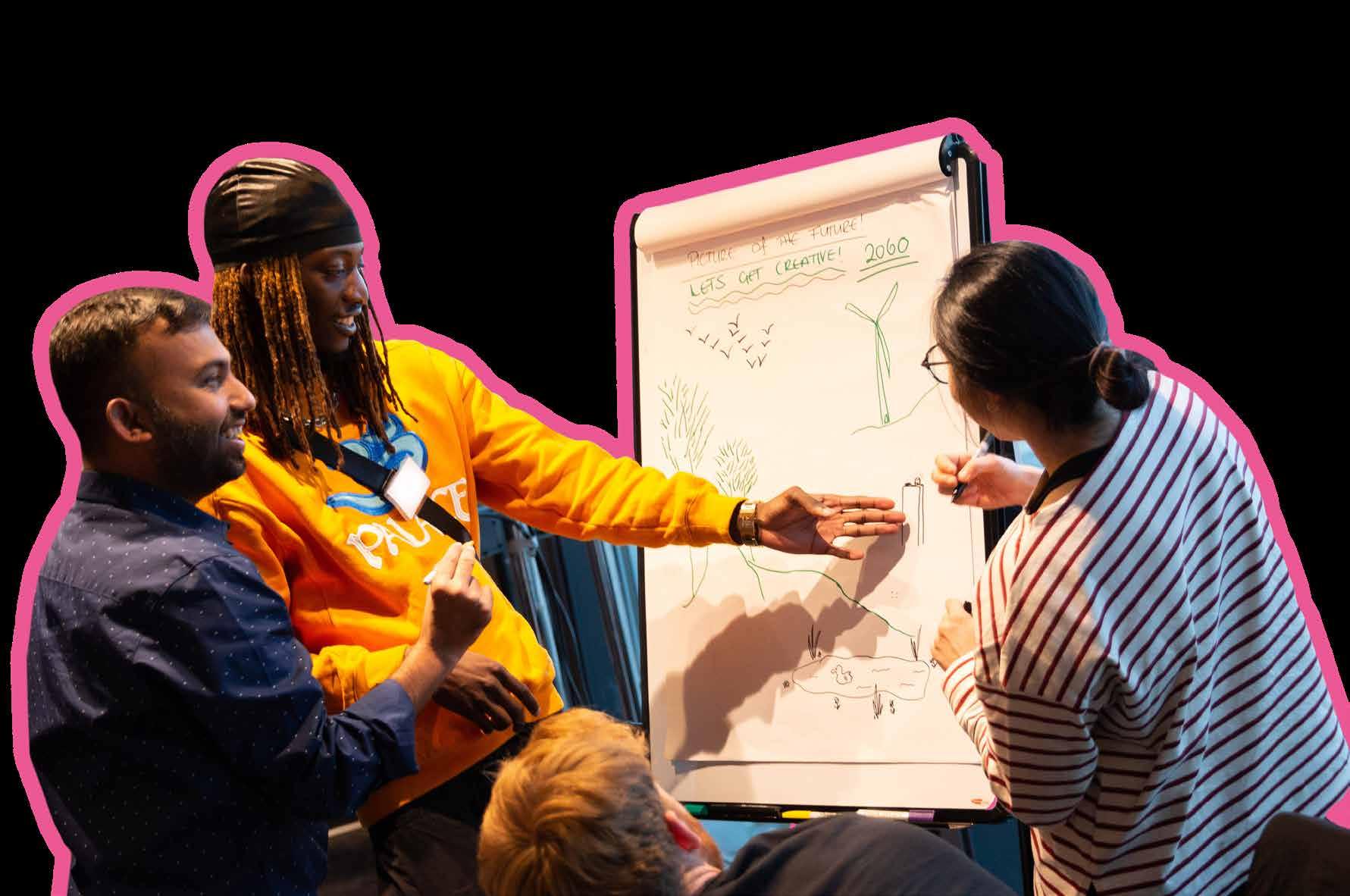
– A Route map towards greater ethnic diversity in the environment sector alongside guidance for environment organisations, led by Wildlife and Countryside Link.



We want to provide the support and space to enable others we work alongside to create lasting change, and to challenge systems that stand in the way. We want to contribute to a socially just and anti-racist society, where people have their rights protected, as well as the opportunity to speak and be heard, and the freedom to express their creativity. And across all our work in A Fairer Future, we are keen to support organisations led by the people they serve.
In 2022, we shared new ambitions for this strategic aim, focusing our support for organisations that are grappling with the complexity of systemic inequity, which sits at the intersections of our priorities. Our transition to a new, more proactive approach across a range of sectors will require patience, care and collaboration. We look forward to working closely with our partners to develop our route to the long-term outcomes we have set out.
The year marked five years of our Young People Leaving Care Learning Programme which celebrated this important milestone as an Independent Review of Children’s Social Care took place in England, and a similar review was announced for Northern Ireland. The voices of care experienced young people are vital to these reviews, and ensuring their voices are heard has been an important focus of the organisations we support. We hope policy makers pay close attention.
We also want to highlight the role of young people across our strategy. The Act for Change Fund, a £3.6m funding partnership programme, which supported the development of youth leadership and activism between 2018-2022 demonstrates how change, led by young people, can help us to reimagine and create a fairer future. Together with Paul Hamlyn Foundation and the 32 organisations supported through the Fund, we shared learning and resources on funding youth activism.

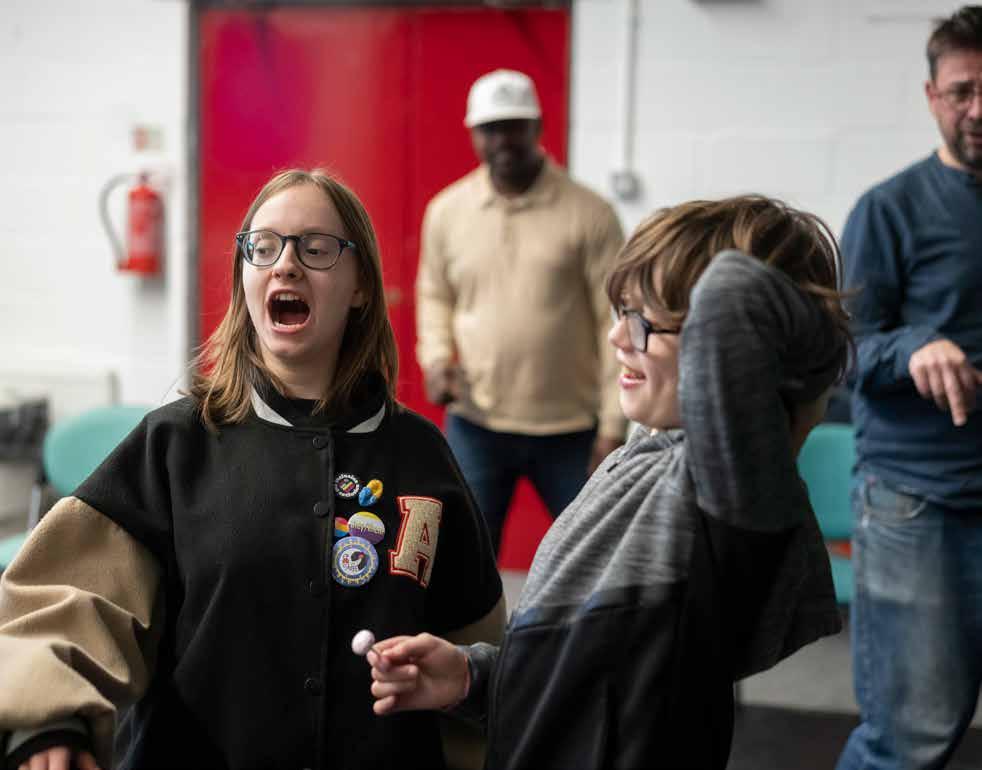

“I really admire the hard work and dedication you (University of Derby Theatre) put in to ensure that the young people have the best opportunities in life. I have witnessed the young people grow in confidence, and I know from speaking to them individually that the sessions have given them a sense of belonging and a community outside of education.
You are all amazing”
Foster Mum
Impact goal
Total funding approved in 2022 £11.7m
Main grants
Total £11.0m
Social Investments Total £400k Tools Total £350k
No. of grants 82 No. of investments 1
Improved systems, policy and practice
Priority
Arts and creativity making change
Grants and social investments15
No. £
Children and young people’s rights
Organisations are strengthened to use their power to tackle systemic injustice and inequity
Gender justice
Migrant justice
Organisations work together and build movements to tackle systemic injustice and inequity
Racial justice
Creativity transforming lives16
20 34 10 10 8 1 £200k
(including £400k social investment)
£2.3m £5.1m £1.1m £1.2m £1.5m
15 Includes relevant partnership funds listed on pages 47 to 48.
16 Priority in previous strategy (2020 to 2022)
Access All Areas
£190,000 (over 2 years)
Towards unrestricted core costs to support Access All Areas to shape, evaluate, and roll out a radical new UK-wide sector consultancy for film, TV and theatre, creating lasting change to inclusion of learning disabled and autistic voices in culture.
174 Trust The Duncairn
£50,000 (over 2 years)
Towards project costs for establishing the Creative Collective as a new youth-led model of creative and professional development for diverse artists in Northern Ireland.
42nd Street
£200,000 (over 2 years)
Towards project costs of the Horsfall, providing creative, inclusive mental health opportunities for young people to make powerful remarkable art to tackle inequity, influence systems and become the future workforce.
Alternative Theatre Company
£120,000 (over 2 years)
Towards unrestricted core costs to support the Bush Theatre’s Talent and Leadership Development and inclusive careers.
Arts & Business Cymru
£100,000 (over 2 years)
Towards project costs to establish a Creative Apprenticeships programme, aiming to create a more inclusive and representative cultural workforce in Wales.
Black Lives in Music
£200,000 (over 3 years)
Towards core costs for the improvement of racial diversity and inclusion in the UK music sector with direct focus on jazz and classical music.
Comic Relief
£200,000 (over 2 years)
Towards delegated grant-making through The Power of Pop (POP) Fund, a pooled fund to support Blackled, grassroots creative organisations.
Graeae Theatre Company
£200,000 (over 2 years)
Towards core costs for the continuation and expansion of the Write To Play programme offering a range of opportunities for disabled writers.
Ideas Test
£105,000 (over 3 years)
Towards core costs of Lyrici Arts, including staff salaries and fees, plus a contribution to production and touring costs of a company aiming to amplify diverse stories and artists in Medway.
Marlborough Theatre Productions Ltd
£120,000 (over 2 years)
Towards core costs to accelerate the transition to a national producing organisation for LGBTQ+ culture.
Ovalhouse Theatre Limited
£30,000 (over 1 year)
Towards core costs to support for the development of Alleyne&, generating research, sharing knowledge, and creating tools based on the Neurology of Power project.
People’s Palace Projects
£55,000 (over 1 year)
Towards core costs for an executive producer post to take forward Museum of Colour’s partnership work exploring and representing the contributions to British arts and culture made by people of colour.
£60,000 (over 9 months)
Towards core costs for emergency funding support.
Project Art Works
£150,000 (over 2 years)
Towards unrestricted core costs to enable the organisation to develop their model of holistic support for neurodiverse artists and to catalyse wider cultural and social change through national partnerships
Rich Mix Cultural Foundation
£133,333 (over 2 years)
Towards unrestricted core costs to nurture the next generation of diverse artists/East End artists from the global majority to step into leadership roles.

Stay Up Late

£20,000 (over 6 months)
Towards unrestricted core costs for work which challenges inflexible support systems that restrict the lives of people with learning disabilities, especially in accessing cultural events
The National Theatre Of Wales
£100,000 (over 2 years)
Towards core costs for the National Theatre Of Wales’ Creative Development work aiming for fundamental change in the diversification, creative ambition and innovation of the theatre sector in Wales.
Theatre Royal Stratford East
£60,000 (over 1 year)
Towards core costs supporting an expanded programme for artists, young people and local communities.
Utopia Theatre
£60,000 (over 2 years)
Towards core costs to staff and pilot a Youth Academy to upskill young people with African oral storytelling and performance techniques.
Venture Arts
£100,000 (over 2 years)
Towards unrestricted core costs to advance the organisation’s work promoting the agency of people with learning disabilities in the cultural sector as artists, advocates and workers.

“We launched Youth Academy, our programme for 9 to 19-year-olds of African/Afro-Caribbean heritage. The programme will enable young people to explore their creativity and build confidence, so supporting the next generation of Black creative talent in Yorkshire. We have also just performed All Our Goals, a community production with a cast of 21 women (including Youth Academy members), to an audience of 580 at the Crucible.”
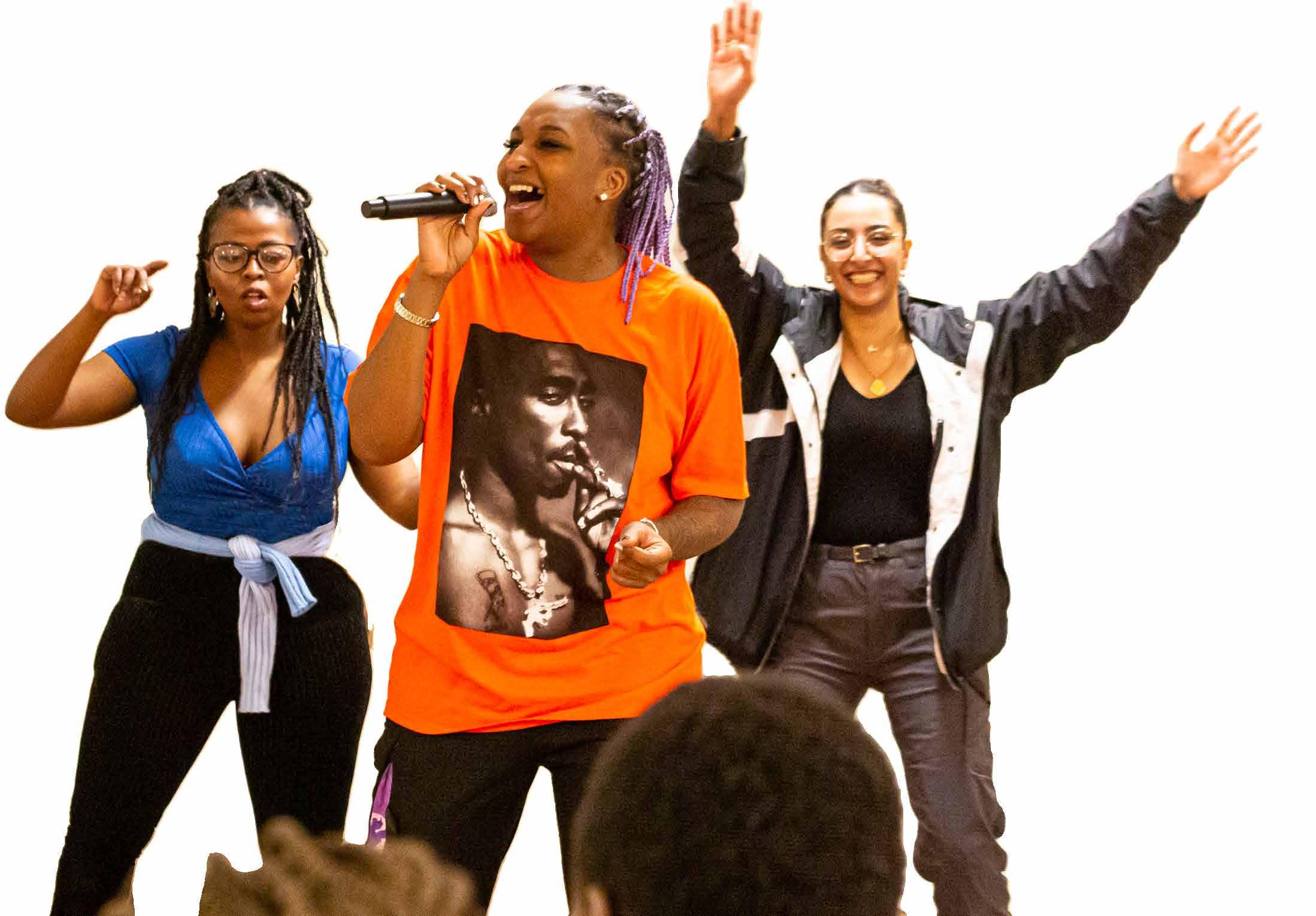
Alliance For Inclusive Education
£187,000 (over 2 years)
Towards unrestricted core costs to develop inclusive coalition to to deliver a disabled youth parliament/ all party parliamentary group.
Alliance for Youth Justice
£20,000 (over 6 months)
Towards core costs of reimagining ‘justice’ for children and young people – an extension to an existing grant supporting the role of the Executive Director.
Aquarius Action Projects
£176,668 (over 2 years)
Towards project costs for Aquarius Cares, supporting young people who are or have been in care, or at risk of returning, to develop their resilience and coping strategies.
Articulate Cultural Trust
£144,000 (over 2 years)
Towards unrestricted core costs to support care experienced young people to unlock, explore and nurture their creative talent, improve wellbeing, and inform creative practice and the care system.

Association for Real Change (ARC)
£130,000 (over 2 years)
Towards project costs for DIVErgent INfluencers (a group of seven young disabled leaders) leading improvements to awareness, knowledge, practice, policy and the lives of all young disabled people in Scotland.
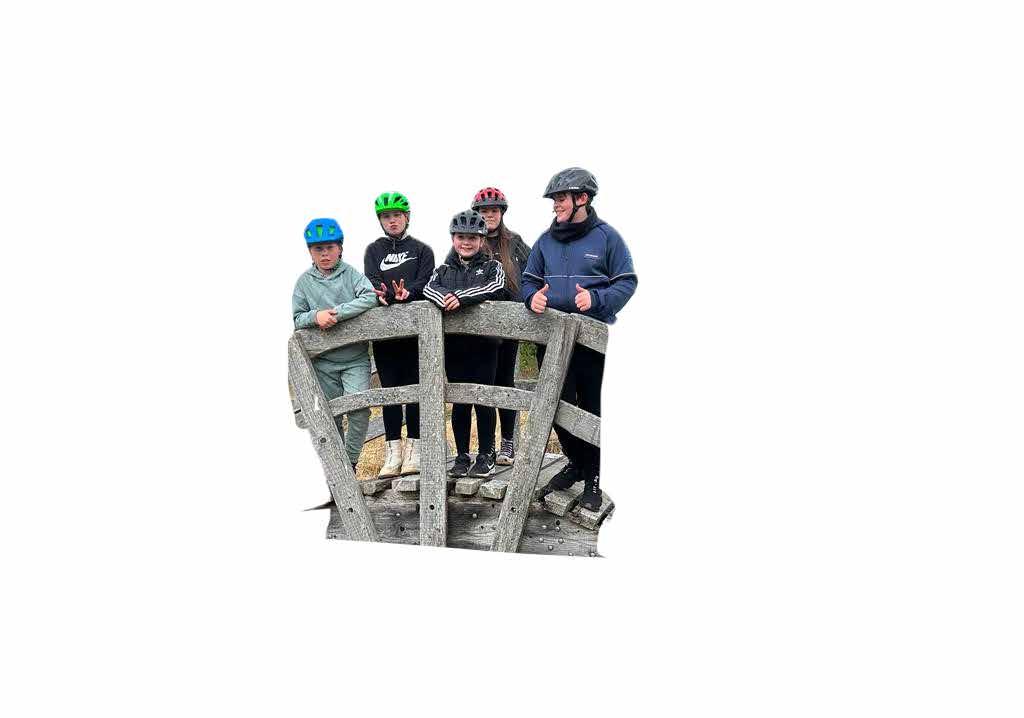

Auditory Verbal UK
£200,000 (over 2 years)
Towards core costs for Hear Us Now – transforming services for the long term and tackling the root cause of disadvantage for deaf children and their families.
Children England
£20,000 (over 6 months)
Towards unrestricted core costs.
Community Law Advice Network
£15,000 (over 10 months)
Towards project costs for additional campaigning resource to support urgent work around children deprived of liberty.
“Thank you for an amazing year, with the new skills and new lifestyle. Without you guys, I wouldn’t be here.”
Young person on the support of Articulate Cultural Trust
Company Three (‘Islington Community Theatre’)
£60,000 (over 2 years)
Towards unrestricted core costs to develop Company Three’s model for creative engagement with young people.
Durham University, Research and Innovation Services
£166,900 (over 1.5 years)
Towards core costs of the next phase of the Contextual Safeguarding approach to consolidate work to date, test assumptions and develop an ethical framework for its implementation.
£195,000 (over 3 years)
Towards unrestricted core costs for a specialist educational Advocacy and Support project to support young ethnic minority people in Wales, addressing inequalities in school exclusions and discrimination within schools.
Fight for Peace International
£60,000 (over 4 months)
Towards unrestricted core costs Enabling Fight for Peace to have National Impact as a Sport England system partner.
FRG Ltd
£200,000 (over 2 years)
Towards unrestricted core costs of Family Rights Group (FRG Ltd), who are challenging structural inequality in the child welfare and family justice system, and helping to build a society where children can live safely and thrive in their family and community.
Future First Alumni Limited
£200,000 (over 2 years)
Towards project costs for Inspiring Inclusion, an unusual alliance of not for profit, community and statutory organisations building place-based collaborations to reduce school exclusions.
Khulisa
£100,000 (over 2 years)
Towards unrestricted core costs of Khulisa, who support young people affected by serious adversity to thrive in the education and justice sectors through delivering programmes that strengthen resilience and coping skills.

NWG Network
£190,500 (over 2 years)
Towards unrestricted core costs for NWG – Strengthening the Sector to Tackle Child Exploitation.
Paul Hamlyn Foundation
£80,000 (over 2 years)
Towards core costs to gather and share evidence and data on the value of arts and cultural education and demonstrating the ways in which arts and cultural education provides children with skills for life.
Platform
£180,000 (over 3 years)
Towards core costs of Voices that Shake! bringing together young people, artists and campaigners to develop youth-led creative responses to social injustice.

South London Refugee Association
£198,000 (over 2 years)
Towards project costs to work with young people towards systematic resolution of nationality and immigration issues for children and young people in care in England, sharing best practice across the nations.
“Co-created with ten young people, an all-Black creative team, and based on the performers’ own life experiences, #BlackIs… showed audiences what it’s like for them to be a Black teenager in London today. It was never intended to be a show but after a year of creatively exploring the topics we talked, ranted, laughed and cried, it was time to share it.”
Company Three
St Christopher’s Fellowship
£129,597 (over 2 years)
Towards project costs to develop the Safe Homes model in children’s homes and 16+ move on semiindependent homes.
Swansea University (Children’s Legal Centre, Wales)

£100,000 (over 2 years)
Towards core costs to develop children’s legal information and empowerment services in Wales, and helping the centre develop a partnership approach to strategic litigation to improve the law for disadvantaged children.
The 4Front Project Ltd
£240,000 (over 3 years)
Towards core costs for the Executive Director and Operation Director of an organisation supporting young people who have experienced trauma, violence and racial injustice, to create lasting systemic change.

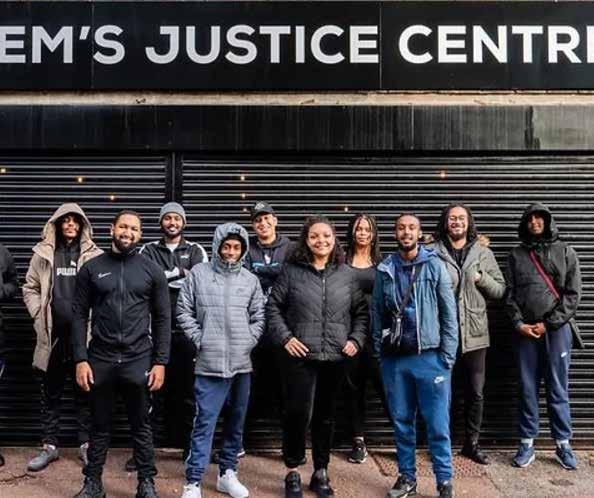
The Advocacy Academy
£300,000 (over 3 years)
Towards unrestricted core costs of an activist youth movement of young leaders fighting for just, systemic change as it grows its campaigns and community teams and develops ways to sustain the momentum its Alumni have achieved.
The Big House Theatre Company
£119,621 (over 2 years)
Towards unrestricted core costs to develop The Big Mouth, to drive change and equip young people with new skills to produce creative materials.
The Difference Education Ltd
£240,000 (over 2 years)
Towards unrestricted core costs of an organisation driving change in inclusive education, influencing Multi-Academy Trusts and local authorities to improve outcomes for vulnerable pupils and reduce exclusions.
“We were being taught about us, where we are being deprived, it was interesting for people to know, interact and ask questions. I don’t think I have seen that before – community wise. Everyone is just fighting for each other to be honest, even through the sad times we were preaching our joy, still showing love to each other and supporting each other. Our opinions and voices have helped shape 4FRONT’s campaign and what 4FRONT puts out there. We are here to be a voice for the youth and through our experiences understanding the youth.”
Boy, 17, on the work of The 4Front Project
The Mix
£200,000 (over 2 years)
Towards unrestricted core costs of an organisation supporting young people through online services, focusing on groups most affected by COVID-19 to improve their mental health and resilience.

The National House Project
£120,000 (over 2 years)
Towards unrestricted core costs to scale Local House Projects and support the growth of the Care Leavers National Movement.
The Social Change Nest CIC
£120,000 (over 2 years)
Towards project costs of the Young Trustees Movement, a joint-funder initiative led by young people to increase both the number of young trustees and charitable boards seeking them and enable the connection between the two.

The Sutton Trust
£100,000 (over 1 year)
Towards project costs to deliver CECIL (Coaching Early Conversations, Interaction and Language) in Liverpool, working to find practical solutions to addressing inequality in children’s early language.
The Youth Sport Trust

£60,000 (over 1 year)
Towards project costs of a developmental pilot, led by young people from racialised communities to challenge and change structural inequality and achieve greater diversity in sport governance.
University Of Derby Theatre Limited
£160,000 (over 2 years)
Towards core costs for work with care experienced young people.
Unlock
£150,000 (over 2 years)
Towards unrestricted core costs to support fair access to employment for people with criminal records.
Voice of Young People in Care
£163,000 (over 2 years)
Towards unrestricted core costs to enhance policy work to educate and support young people in and leaving care to positively impact and influence legislation, policy and practice, and the care system in Northern Ireland.
.
“Our Odyssey was an innovative VR project, co-created by participants, showing the reality of transient lives but also looking towards hope for the future. The impact on audiences’ understanding and empathy was huge. It had 75 contributors to initial needs analysis, 27 co-creators, 15 performers, 21 sessions, 24 sold out shows, 2 films, and winner of the Stage Awards Digital Project of the Year.”
University of Derby Theatre
Age UK Oxfordshire
£199,872 (over 2 years)
Towards project costs of the Creative Later Life 2025 programme, ensuring older people have agency and equity of access to culture.
Asian Women’s Resource Centre
£193,100 (over 3 years)
Towards core costs for organisational development to address inequity and historical disadvantage of Black and Minority Ethnic organisations’ as well as support training bursaries ringfenced for Black and Minority Ethnic professionals.
Birth Companions
£100,000 (over 2 years)
Towards unrestricted core costs to support pregnant women, new mothers and babies with multiple disadvantage.
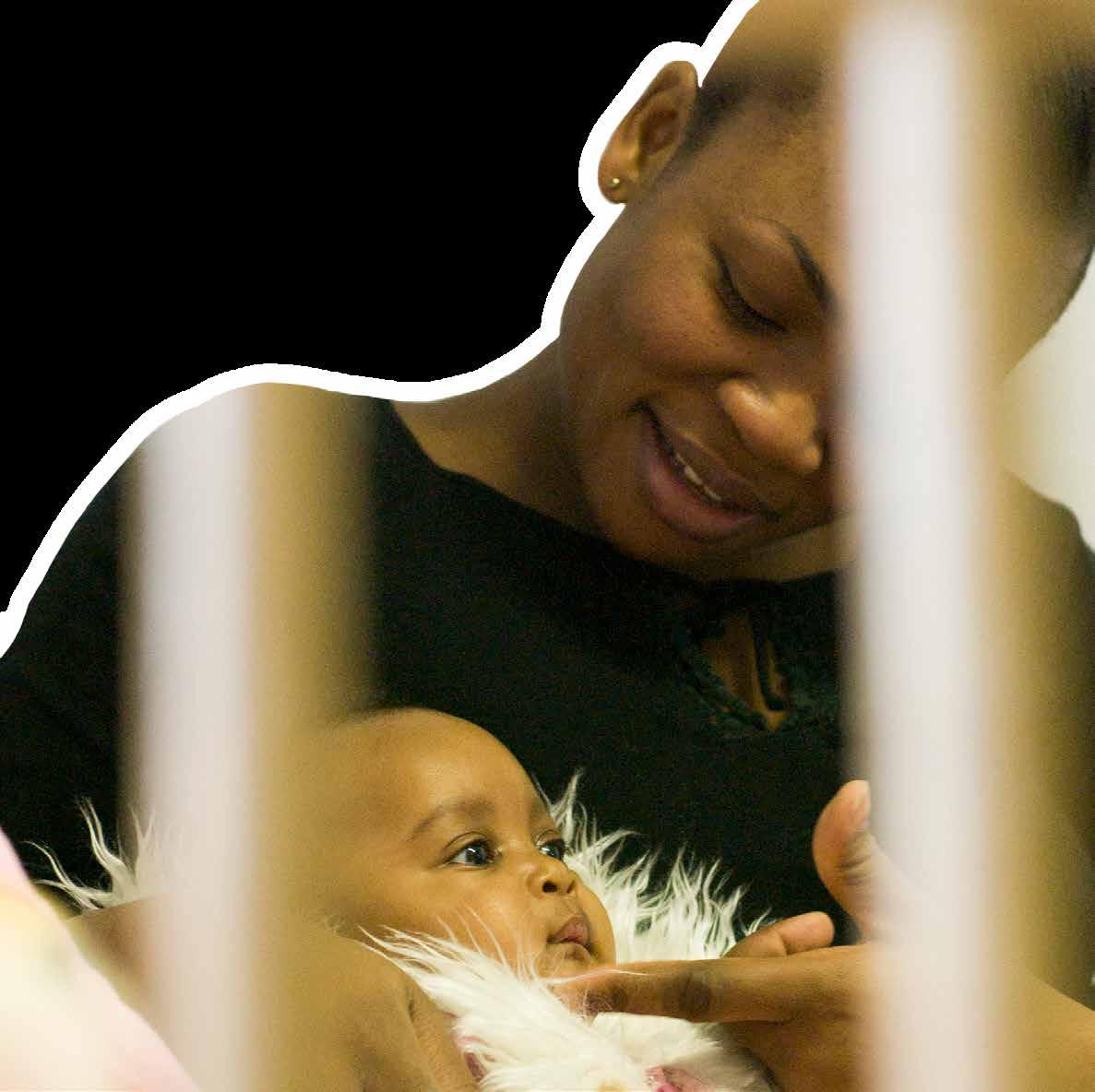
“We’re so proud of the work of our amazing Lived Experience Team in 2022. Highlights include their work to support the Chief Social Worker’s review of Mother and Baby Unit applications in prisons, the Giving HOPE project (designing boxes for women separating from their babies at birth) and a meeting with the Princess of Wales, who was very interested in their campaigning work with Birth Companions.”
Birth Companions
Circles South East
£50,000 (over 1 year)
Towards unrestricted core costs for interim funding to continue important work with perpetrators, their families, and survivors of sexual abuse.
Fylde Coast Women’s Aid
£40,000 (over 1 year)
Towards project costs for the Stalking and Harassment Project.
Karma Nirvana
£150,000 (over 3 years)
Towards unrestricted core costs to tackle honour based abuse and forced marriage by supporting survivors, professionals and influencing policy and practice.
LEAP Sports Scotland
£95,232 (over 2 years)
Towards core costs for Trans Sport Policy and Participation, a project to increase inclusion of trans people in sport and physical activity in Scotland whilst tackling the multiple barriers which exclude.
National Ugly Mugs (NUM)
£20,000 (over 6 months)
Towards project costs to support development of deeper partnerships between three organisations supporting sex workers.
“In October 2022 we delivered our first in-person LGBTIQ Sport and Physical Activity Conference since 2018. The conference brought together activists, stakeholders and community members from across Scotland, the UK and Europe to discuss and share impactful stories and projects.”
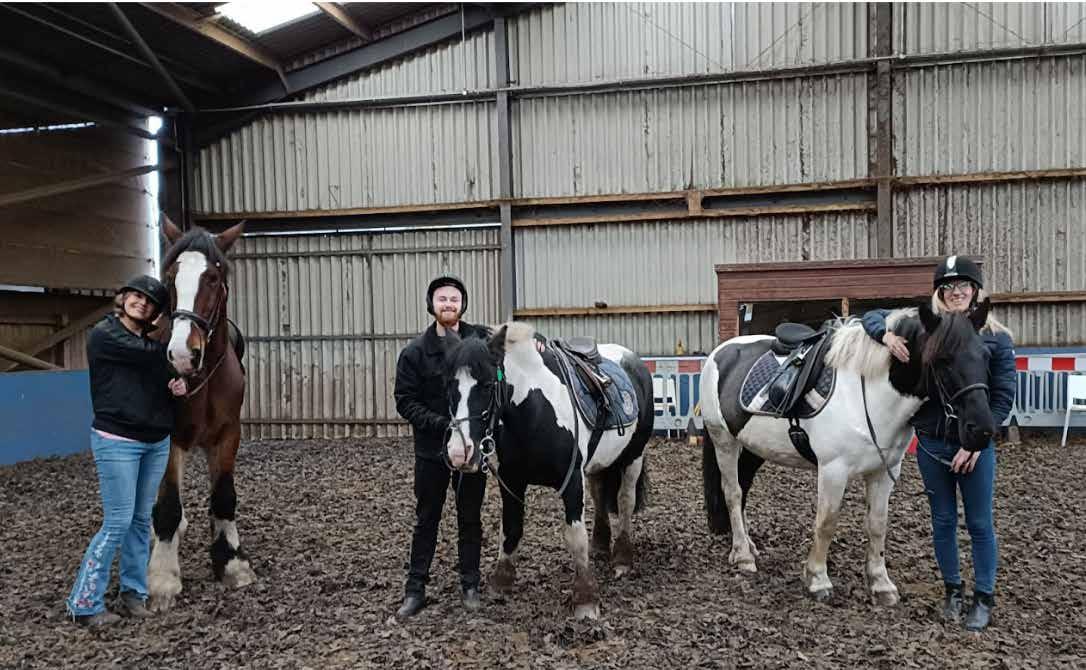
£198,857 (over 2 years)
Towards core costs to bring about systemic change so all women who have a child removed through the family court are offered support to prevent the damaging cycle of repeat removals of children from their care.
Saheliya
£140,000 (over 3 years)
Towards unrestricted core costs to enable more women experiencing racial inequity to better access justice and safety through trauma informed and rights based interpreting services.
Tender Education And Arts
£120,000 (over 2 years)
Towards unrestricted core costs to prevent domestic abuse and sexual violence in the lives of children and young people through innovative, creative programmes.
Participant from LEAP Sports Scotland’s Trans Women in Sport Group who was supported to try a new sport
Learn more about the Conference and see an illustration by Jules Scheele summarising the event.
“That was exhilarating. I’m often worried trying out a new sport, especially one seen as so traditional like horse riding. The staff were great and attentive, I felt such a rush of achievement afterwards – I felt I could do anything!”
British Refugee Council
£60,000 (over 1 year)
Towards delegated grant-making in a partnership between British Refugee Council and Migration Exchange to raise and distribute £250k to Afghan-led Refugee Community Organisations.
Citizens UK
£160,000 (over 2 years)
Towards project costs for ‘Together We Can’, combining migrant organising with existing Sponsor Refugees and resettlement work to create strong and unified challenges to immigration injustice.
“Our Refugees for Justice inquiry chaired by Baroness Helena Kennedy investigates asylum housing and support provision during the pandemic, with impacted community members on the panel. We are the sole refugee organisation granted Core-participant status at the Scottish COVID-19 Public Inquiry, enabling refugees to ask pressing questions and contribute to recommendations.”
Compass Collective
£60,000 (over 2 years)
Towards core costs for Compass Collective to use creative arts to help unaccompanied refugee minors and young people seeking asylum build skills and resilience to support their transition to a new life in the UK.
Ecpat UK
£100,000 (over 2 years)
Towards core costs to support our work tackling child trafficking and exploitation through an integrated approach involving direct work with young victims informing campaigning, research and education.
Focus on Labour
Exploitation (FLEX)
£50,000 (over 1 year)
Towards unrestricted core costs to enable the delivery of a programme aimed at preventing the labour exploitation of Ukrainian nationals.
Law Centres Federation
£130,000 (over 2 years)
Towards unrestricted core costs to rebalance civil justice via harnessing Law Centres’ unique evidence and working with local communities and partner organisations.
Migrant Voice
£240,000 (over 3 years)
Towards unrestricted core costs for the implementation of a new strategy to build migrant voices, power and influence to challenge structural inequality and injustice.
Positive Action
In Housing Ltd
£200,000 (over 3 years)
Towards unrestricted core costs employing two Advocacy and Campaigns Officers to lead the campaign against the government’s hostile policies towards refugees and asylum seekers.
Star (Student Action For Refugees)
£120,000 (over 2 years)
Towards unrestricted core costs to tackle the systemic barriers which block access to higher education for forced migrants and develop the lived experience activists group.

The AIRE Centre
£80,000 (over 2 years)
Towards unrestricted core costs supporting women experiencing abuse in the UK.
GIRLDREAMER LTD
£120,000 (over 3 years)
Towards core costs to support the personal and professional development of Young Women
Of Colour, break down systemic barriers and empower them to influence social change.
INQUEST Charitable Trust
£60,000 (over 4 months)
Towards unrestricted core costs to support Inquest through a challenging time and shortfall in income.
Maslaha
£150,000 (over 3 years)
Towards unrestricted core costs of an organisation working to challenge and change the conditions that create inequalities for Muslim communities.
BAME HUB CIC
£60,000 (over 9 months)
Towards unrestricted core costs to tackle racial inequality through targeted and tailored support services delivered to racialised people and communities in the UK.
£258,585 (over 3 years)
Towards unrestricted core costs for evidenced-based advocacy to reform stop and search and to support trauma- informed resourcing for impacted communities.
Stuart Hall Foundation
£195,444 (over 3 years)
Towards core costs to support the enrichment of public education by hosting talks and events that address urgent questions of race, class and intersecting inequalities within the UK.
The Anthony Walker Foundation
£350,000 (over 5 years)
Towards core costs to tackle racism and injustice across Liverpool, working with schools, employers, statutory bodies, housing associations, all levels of Government to develop strong anti-racist policy and practice.
Zahid Mubarek Trust
£300,000 (over 5 years)
Towards unrestricted core costs to challenge and change racial inequality and injustice in the prison system.
London Early Years Foundation
£400,000 (over 7 years)
An investment to facilitate a nursery acquisition as part of a seven-year expansion plan for London Early Years Foundation.
We want to strengthen the bonds in communities, helping local people to build vibrant, confident places where they can fulfil their creative, human, and economic potential.

Our approach to working with communities and places is evolving, thanks to the exciting collaborations we have across this strategic aim.
As places tackle social, economic and environmental challenges, and continue their post pandemic recovery, the power of collaboration is becoming increasingly evident and important. We have seen this through our partnerships such as LocalMotion, a collaboration between six funders and six places. LocalMotion continues to test our understanding of how we view place and communities. Together, we are re-examining and redefining the relationships between funders and those who are already leading the hard and important change in their communities.
Change also requires creativity. Creative Civic Change, which ran from 2018 to 2022, demonstrated that when communities are empowered through trust-based funding and resourced with expertise, they are enabled to unleash creative imagination and create a legacy that will last beyond the initial investment.
During the year, we also continued to support creative institutions at the heart of communities that are responsible for being custodians of our collective past and future. The Esmée Fairbairn Collections Fund in partnership with the Museum Association is at the heart of this endeavour, supporting museums and galleries to better reflect the diverse communities that make up our places and communities. In 2022, we re-committed to the Fund, with a £2.7m grant to support inclusive collections and participation work across the museum sector.
“The sense of common purpose is as energising as getting to know people in my local area. Everyone has something unique to offer, from knowing what’s going on to inspiring others or having a skill they’ve picked through their job. Who wouldn’t want to be part of this?”
Volunteer Cooperative Director, Repowering London
Communities working together for change
Action with Communities in Cumbria
£139,450 (over 2 years)
Towards unrestricted core costs to drive the delivery of sustainable, thriving communities in the Lake District National Park making it the best place it can be for the communities that live, work and visit.
Centre for Sustainable Energy
£60,000 (over 1.5 years)
Towards core costs for Planning Locally to Address the Climate Emergency (PLACE) - all communities can realise their power to lead and influence effective place-based action on the climate crises.
Birmingham CIC
£60,000 (over 6 months)
Towards core costs to provide capacity to consolidate learning and plans and consider what is required for the next phase of Civic Square’s ambitions in Ladywood, Birmingham.
Community Land Scotland
£180,000 (over 3 years)
Towards project costs supporting a programme of work to enable a stronger community ownership sector across all of Scotland.
Empty Homes Agency
£60,000 (over 1 year)
Towards project costs to complete a one-year feasibility study for a community partnership project to retrofit empty homes and deliver green skills training to help address empty homes and climate change at a local level.
Fauna & Flora International
£194,757 (over 3 years)
Towards core costs for expanding community-led nature restoration across land and sea in Scotland.
Foothold Cymru
£175,000 (over 3 years)
Towards project costs for Full Circle, a pioneering, community-led initiative in West Wales to demonstrate, capture and share a blueprint for community led social and environmental justice focused action and enterprise.
May Project Gardens CIC
£60,000 (over 2 years)
Towards core costs expanding the learning from May Project Gardens to other grassroots organisations using the environment, food and creative arts to empower marginalised groups.
“We recruited a coordinator for our Coastal Communities Network (CCN) –a position that did not exist before, and was something that CCN members had requested to support their collective efforts in marine conservation and advocacy. Since being in post, the coordinator has provided increased scope for a more independent and authentic community voice to emerge for CCN, whilst concurrently freeing up time for Fauna & Flora staff to focus on both operational support and guidance to the Network and its members. The coordinator is already helping the network to redevelop its shared visions and mission, facilitating meetings between CCN and key government agencies and MSPs, and strengthening collaboration between members.”
Empty Homes Agency
“We’re delighted that our Retrofit Empty Homes Action Partnerships feasibility study has captured so much energy and enthusiasm from communities, local authorities and partners. There is clear appetite for action to fully insulate homes, integrate sustainable energy generation and build green infrastructures at the local level.”
Power To Change Trust
£30,000 (over 4 months)
Towards project costs for We’re Right Here: the campaign for community power.
Right to Succeed
£300,000 (over 3 years)
Towards unrestricted core costs of an organisation delivering collective, place-based approaches to improve outcomes for children and young people in the most disadvantaged communities.
Right to Succeed
£60,000 (over 1.5 years)
Towards unrestricted core costs for the Place Matters pilot programme, supporting UK place-based practitioners and communities who are delivering complex change to learn from each other in order to improve outcomes.
Squash CIC
£32,500 (over 6 months)
Towards core costs for Back on Track, a restorative and regenerative programme of community participation and organisational emboldening; to re-group, strengthen relationships, and nurture confidence as we continue to thrive.
Voluntary Action Orkney
£200,000 (over 3 years)
Towards project costs for Island Wellbeing Project, a community-led partnership which works to improve the health, economic and social wellbeing of residents across Orkney’s ferry-linked isles.
Alexandra Park and Palace Charitable Trust
£150,000 (over 3 years)
Towards core costs for Young Creatives Network; empowering young people in Haringey to work directly with local services to regenerate cultural provision and open up alternative routes to careers in cultural industries.
Arts at the Mill CIC (trading as The Old Courts)
£479,375 (over 2 years)
Towards project costs to lead a national framework for cultural community wealth building through the Collaborative Touring Network.
“Our 2022 tour of ‘Bunker of Zion’ demonstrated that when you make work with and for communities, it opens up access to the arts. Ethnic diversity in the audiences and participants for this show was nearly four times that of the current national average for arts audiences and twice that of the national population in general.”
Arts at the Mill (The Old Courts)

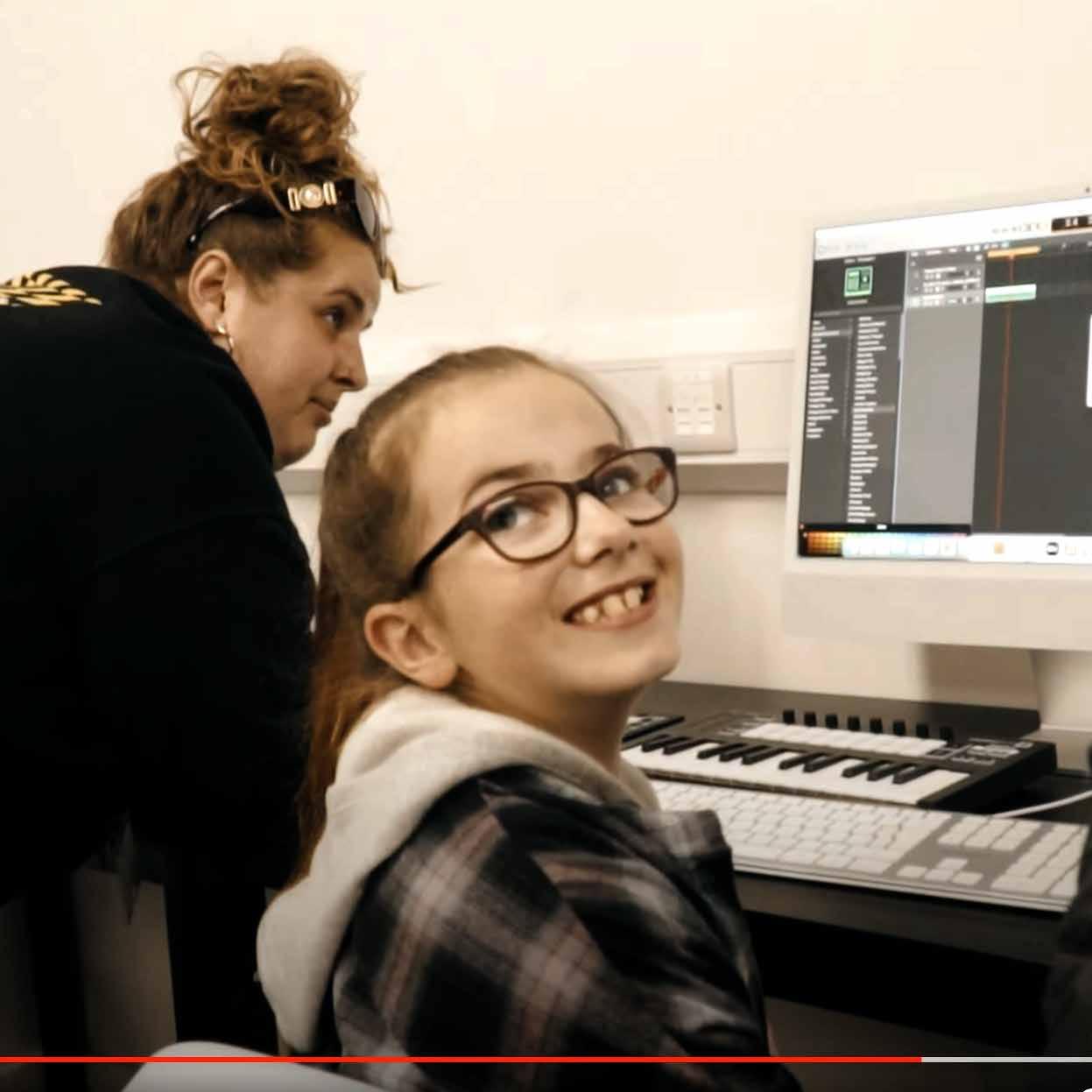
Arts At The Old Fire Station
£240,000 (over 4 years)
Towards unrestricted core costs to recover from COVID and develop Arts At The Old Fire Station’s practice to better apply creativity to place-making and influence others to focus on good quality relationships and meaningful measurement.
AudioActive

£112,000 (over 2 years)
Towards unrestricted core costs towards a new sub-regional ‘centre of excellence’ for socially engaged musical talent development.
Back to Ours Arts Limited
£95,000 (over 3 years)
Towards unrestricted core costs for developing stronger, vibrant communities in Hull, through residentled, hyper-local arts programming.
Beavers Arts Limited
£300,000 (over 3 years)
Towards unrestricted core costs to support a co-created arts and cultural programme in Stoke and document, evaluate and share the work and B Arts methodology.
Contemporary Dance Trust Limited
£400,000 (over 4 years)
Towards project costs of the Rural Touring Dance Initiative to support artists and local cultural leaders to embed dance in rural performance.
Coventry City Of Culture Trust

£200,000 (over 1.5 years)
Towards unrestricted core costs of a two-year legacy programme, commissioning co-created cultural activity which encourages behaviour change related to the climate crisis.
HighTide
£60,000 (over 1 year)
Towards unrestricted core costs for HighTide 2022/23 outreach and artist development in the East of England
Leeds Playhouse
£132,318 (over 2 years)
Towards project costs for co-creation and community engagement linked to the Leeds2023 year and beyond. Liberdade Community Development Trust
£120,000 (over 3 years)
Towards unrestricted core costs to support development of the organisation’s social change, community-led venue model.
“What AudioActive are doing in Worthing is going to set the trend for every high street in the UK. The imagination and graft and energy is palpable. What was a Dorothy Perkins is now a venue, training space, centre of excellence, sanctuary and haven to music entrepreneurialism and belonging for young people.”
Richard Freeman, Always Possible
MAIA
£180,000 (over 3 years)
Towards core costs for an arts and social justice organisation which explores the intersections of cultural production, Black imagination and systems transformation.
Museums Association
£2,683,794 (over 2 years)
Towards delegated grant-making to develop a new iteration of the Esmée Fairbairn Collections Fund, focusing on embedding inclusive collections and engagement work across the museum sector.
Peak – Art in the Black Mountains
£60,000 (over 2 years)
Towards unrestricted core costs to support development and progression in creative careers for young people in rural South Wales.
Rent-A-Role Drama Service
£160,000 (over 4 years)
Towards project costs for a programme of work that builds Plymouth communities’ own creative voices, gives them a platform and redistributes ownership in cultural programming.
Revoluton Arts
£90,000 (over 3 years)
Towards core costs for long term creative engagement and coproduction with diverse communities and strategic planning work.
Royal Liverpool Philharmonic Orchestra
£300,000 (over 4 years)
Towards project costs for In Harmony Liverpool 2022-26: expanding 11+ provision in a long-term project to transform lives, restore communities and develop creativity and talent in Anfield and Everton.
Royal Shakespeare Company (RSC)
£199,950 (over 2 years)
Towards project costs for a programme of co-created performance and participatory work, supporting creative regeneration in seven communities across England.
Sense, The National Deafblind And Rubella Association
£176,000 (over 2 years)
Towards project costs for developing a model of local arts hubs as shared, inclusive places for disabled and non-disabled people to co-create artistic programmes for the whole community.
Sistema Scotland
£300,000 (over 4 years)
Towards unrestricted core costs to improve the lives of children and strengthen disadvantaged communities over the long term through Sistema Scotland’s Big Noise programmes.
Watch a short film about Sistema Scotland’s Big Noise project in Wester Hailes.
“I wouldn’t be where I am without Big Noise. It has supported me for the last 11 years of my life, every step of the way […] Before Big Noise I didn’t have many aspirations, like going to university, but now I have the motivation to be the best and do the best I can in life.”
Symone,Big Noise graduate
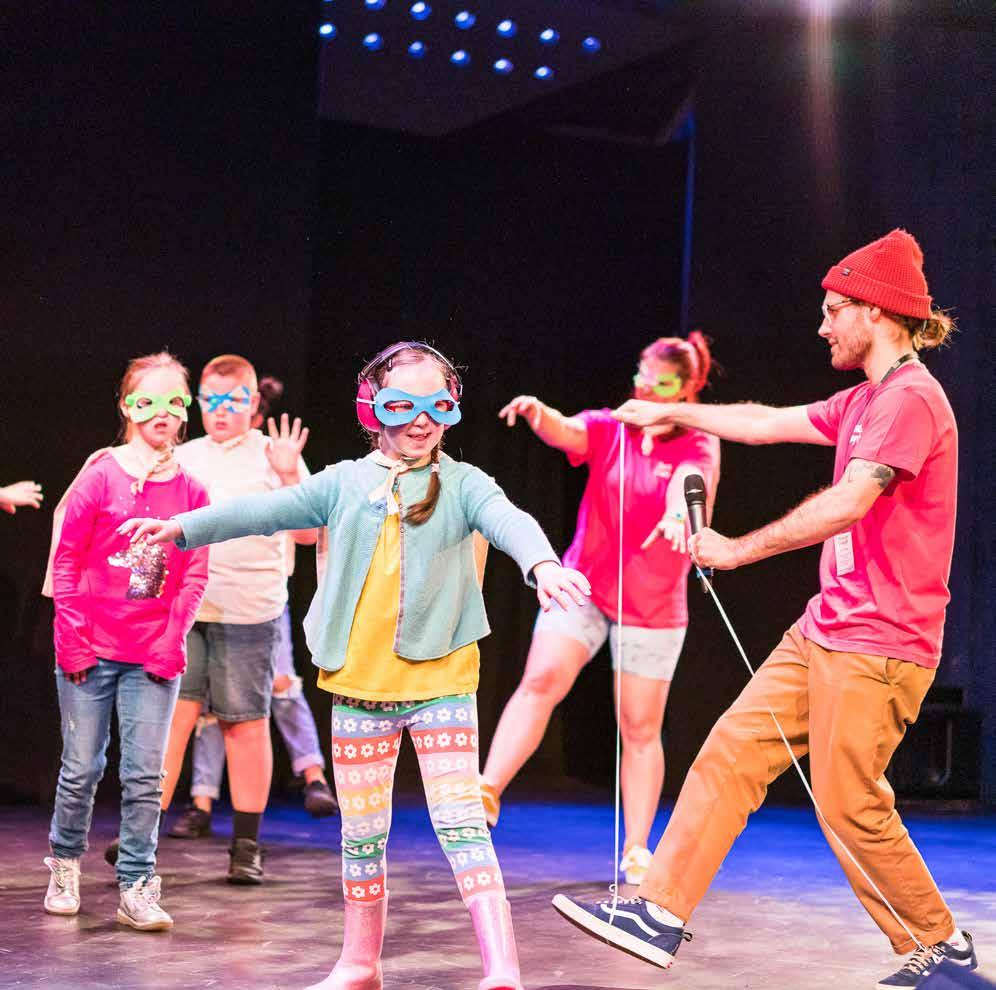


Streetwise Opera

£120,000 (over 2 years)
Towards unrestricted core costs to enable Streetwise Opera to lead the way in exploring, redefining and embedding the arts into homeless services.

The National Federation Of Music Societies
£199,880 (over 3 years)
Towards unrestricted core costs for supporting community music groups to become more financially and administratively resilient, more inclusive and better able to influence local and national policy making.
Theatr Clwyd Trust Ltd
£300,000 (over 3 years)
Towards core costs to maintain and expand on engagement and cocreation with a range of communities and groups of people in Flintshire.
ZoieLogic Dance Theatre
£67,640 (over 2 years)
Towards core costs supporting the Head of Engagement to lead the company’s vision and delivery model for engagement.
“We are proud of how all the groups we work with have adjusted to the temporary facilities. It has enabled us to continue to work with some of the most vulnerable people in our community and with new groups such as on Windows, an intergenerational story sharing project that took place through the windows of a local hospital.”
Theatr Clwyd Trust

“Our male youth dance company FuzzyLogic were on the telly in March as part of BBC Arts and One Dance UK’s Dance Passion! And in April, we dusted off Stanley the 1980s Ford Orion and took our crowd-pleasing outdoor show RIDE back on tour with 10 free performances across Southampton, where the show attracted audiences of over 2,600 local people from across the city.”



Greater Manchester Centre for Voluntary Organisation
£44,000 (over 4 months)
Towards project costs to research into opportunities and barriers for social investment among diverse racialised communities in Great Manchester. This will contribute to the business plan and spin out of a GMCVO-hosted network in 2022/23.
Manchester Innovation Activities Hub Ltd
£60,000 (over 1 year)
Towards project costs for a new VCSE-run, clean-tech industrialisation and skills training centre to rapidly upskill, reskill and retrain local people.
Northern Roots (Oldham)
£1,000,000 (over 2 years)
Towards unrestricted core costs for Northern Roots – creating the UK’s largest urban farm and eco park in a post industrial northern town.
OrganicLea CIC
£160,000 (over 3 years)
Towards project costs to create a replicable diverse cross-borough network of community-driven growing projects working together to build a better local food system that is rooted in social, economic and racial justice
Social Investment Business Foundation
£15,000 (over 1 year)
Towards project costs for the ongoing development of local economic trackers begun in partnership with Tortoise Media and now continuing with the Financial Times.
“As a brand new charity, with no infrastructure, we provided work placements for 150 young people, created four surprising and joyful free arts events attended by over 1200 people, gave start up grants to four small local businesses, and harvested our first food crops. We also secured planning permission and funding for our Visitor Centre, Learning Centre and Bike Hub.”

Repowering London
£750,000 (over 5 years)
An investment to triple London’s community-owned renewable energy assets over the next five years.
We want to ensure that our natural world is restored and protected, and that people benefit from that recovery.
Ambitious partnerships and collaborations that can influence and deliver change at scale continue to play a key role. In 2022, we supported Nature North, a collaboration between 10 major organisations working together to create a thriving environment across Northern England. At a national scale, we worked with WWF, RSPB and the National Trust on a major citizens assembly to develop the Peoples’ Plan for Nature.
We expanded our support for peatland restoration: with the North Wales Wildlife Trust on the Anglesey Fens; across the whole of Northern Ireland with a collaboration convened by Ulster Wildlife Trust; and in Scotland with the Argyll and the Isles Coast and Countryside Trust (ACT), Crichton Carbon Centre and the North Highlands
Initiative. We’re also pleased to be supporting RE-PEAT, a youth-led peatland collective aiming to transform how people treat peatlands through collaboration, education and a process of re-imagining.
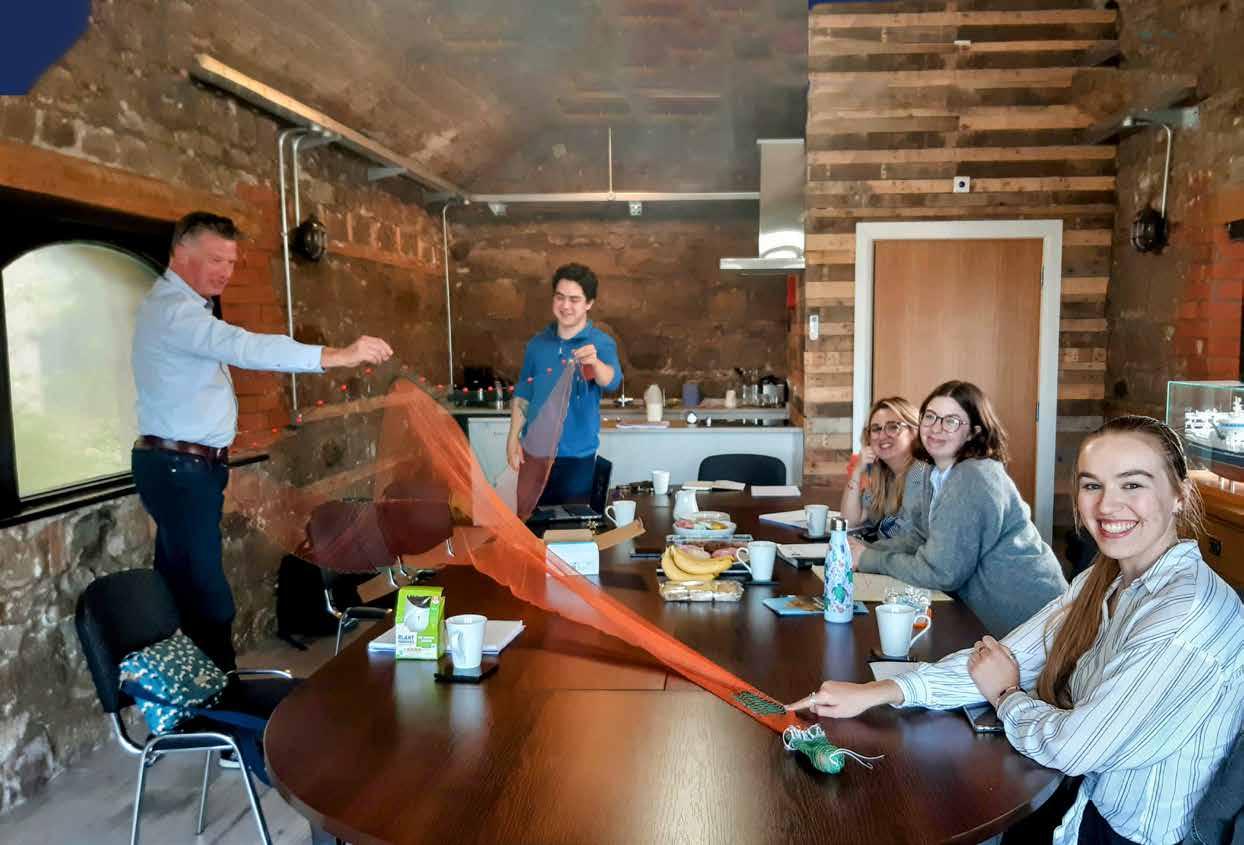
Across our strategy, we believe communities should be at the heart of change. On freshwater, we’re working with Freshwater Biological Association, River Action and the Rivers Trust to support community-led groups to take action on the state of their rivers. And using our Tools, we’re working with a communications consultancy to support local community-led freshwater campaigns.
To influence the development of high integrity and community-focused models of financing nature we worked with a range of new partners, including Nature Scot, the Bank of England and Dark Matter Labs.
“Northern Ireland Marine Task Force has established an open, respectful dialogue and long-term relationship with the fishing industry (Northern Ireland Fishermen’s Federation) through regular meetings, finding joint positions on new policies, working together to develop future visions for Northern Irish seas – this is even more critical with offshore renewable energy plans and understanding and protecting the role of blue carbon.”
Greenpeace Environmental Trust
£60,000 (over 8 months)
Towards project costs monitoring marine activity in Scottish waters and supporting sustainable fishers.
Plymouth Fishing and Seafood Association
£60,000 (over 6 months)
Towards core costs supporting sustainable fishers to secure better futures and engage on regeneration.
REAF CIC
£60,000 (over 1 year)
Towards core costs supporting sustainable fishers and their futures in East Anglia.
Freshwater River Action
£200,000 (over 3 years)
Towards core costs to support River Action’s campaigns to rescue Britain’s rivers.
Scottish Wildlife Trust
£60,000 (over 1.5 years)
WildFish
£295,000 (over 3 years)
Towards core costs to increase policy support using the data from SmartRivers to drive improvements and achieve reform of open-net salmon farming.
Afonydd Cymru
£180,000 (over 3 years)
Towards unrestricted core costs for Afonydd Cymru to coordinate the Welsh rivers trust movement, advocating for and driving improvement in rivers in Wales.
Fish Legal
£60,000 (over 2 years)
Towards core costs for strategic legal action and advocacy to protect the freshwater environment.
Freshwater Biological Association
£295,290 (over 3 years)
Towards core costs developing and expanding the Riverfly Citizen Science Programme.
Towards project costs for Riverwoods Investment Readiness Pioneers.
Surfers Against Sewage
£290,000 (over 3 years)
Towards core costs for empowering communities across the UK with knowledge and tools to take action to protect, improve and restore coastal and inland waters, with a focus on rivers.
The Rivers Trust
£800,000 (over 3 years)
Towards unrestricted core costs to scale up delivery through collaborative, multi-sector approaches.
Wildlife and Countryside Link
£55,000 (over 1 year)
Towards project costs for a campaign on chemicals awareness and action to run during 2022–2023.
“Perthshire Nature Connections Partnership (PNCP) is a long-term, nature-based vision to create a connection across Highland Perthshire between the Cairngorms and the Loch Lomond & The Trossachs National Parks. It works with a range of organisations across community, environment and land management. PNCP promotes integrated, large-scale ecological restoration of a sustainable and resilient landscape that provide environmental, socio-economic and health and wellbeing benefits to communities and land-managers.”
Upper Tay Catchment Communities – one of the Riverwoods Investment Readiness Pioneers, an initiative led by Scottish Wildlife Trust.

Nature friendly farming
FFCC LIMITED
£60,000 (over 6 months)
Towards project costs for the early stage development of a pilot Agroecological Development Fund in the South West of England.
FFCC LIMITED

£1,250,000 (over 3 years)
Towards core costs to enable the Food, Farming and Countryside Commission to continue its work to stimulate and accelerate a transition to agroecology across the UK.
Growing Communities/ Better Food Traders

£240,584 (over 3 years)
Towards project costs developing the Better Food Traders network of farmer-focused sustainable and ethical food retailers, working to increase nature-friendly farming in the UK.

Nourish Scotland

£200,000 (over 3 years)
Towards unrestricted core costs that will enable Nourish to continue advocate for a sustainable, nature friendly food system for Scotland.
Pesticide Action Network UK
£500,000 (over 5 years)
Towards unrestricted core costs to support work on reducing pesticide use.
Progressive Farming Trust Limited
£200,000 (over 3 years)
Towards core costs to extend the audience and reach of Agricology to help farmers transition to nature friendly forms of farming.
Royal Agricultural Society of England
£224,412 (over 2 years)
Towards project costs to turn the recommendations in the Farm of the Future report into practical actions in support of nature-friendly farming.
“In 2022, after three years of advocacy from PAN UK, Tesco launched its new Pesticide Policy which constitutes a huge step forward in reducing pesticide-related harms caused by its global supply chains. As part of its new approach, the company banned 200 Highly Hazardous Pesticides from use by any of its growers worldwide, thereby better protecting both humans and wildlife.”
RSPB (The Royal Society for the Protection of Birds)
£300,000 (over 3 years)
Towards core costs for supporting The Pesticide Collaboration as a civil society movement acting on pesticides harm.
Sustainable Food Trust
“Esmée Fairbairn is one of the very few UK foundations that have food and farming in their DNA. Not only that, but they deeply understand the need to back a growing organisation, and stay with them during their development. This is exactly what they have done for the Sustainable Food Trust and the benefits have been comprehensive, verging on the extraordinary. They do their research carefully and ensure the funding is both strategic and instrumental. They have backed a succession of our projects over a number of years which, collectively, are making a huge difference – including True Cost Accounting, Sustainable Diets and, most recently, the Global Farm Metric. Most importantly, they have backed us for the long-term. For any organisation that is really trying to make a difference, such support is crucial.”
Sustainable Food Trust
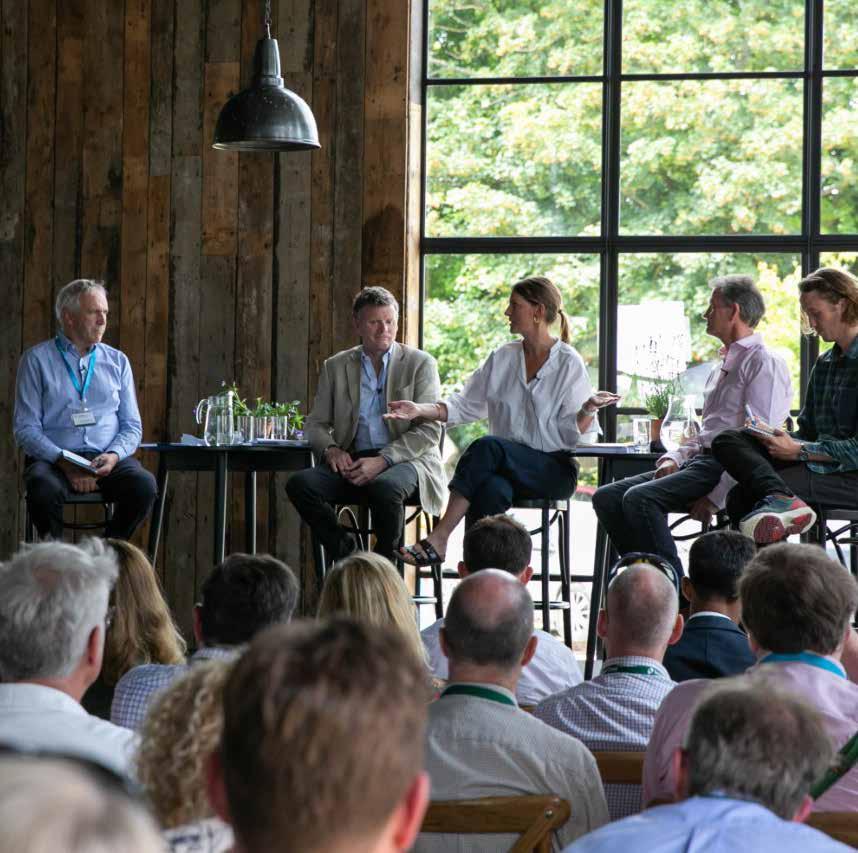
The Sustainable Soils Alliance Community Interest Company
£300,000 (over 3 years)
Towards core costs to enable the Alliance to continue its work to improve soil health in the UK.
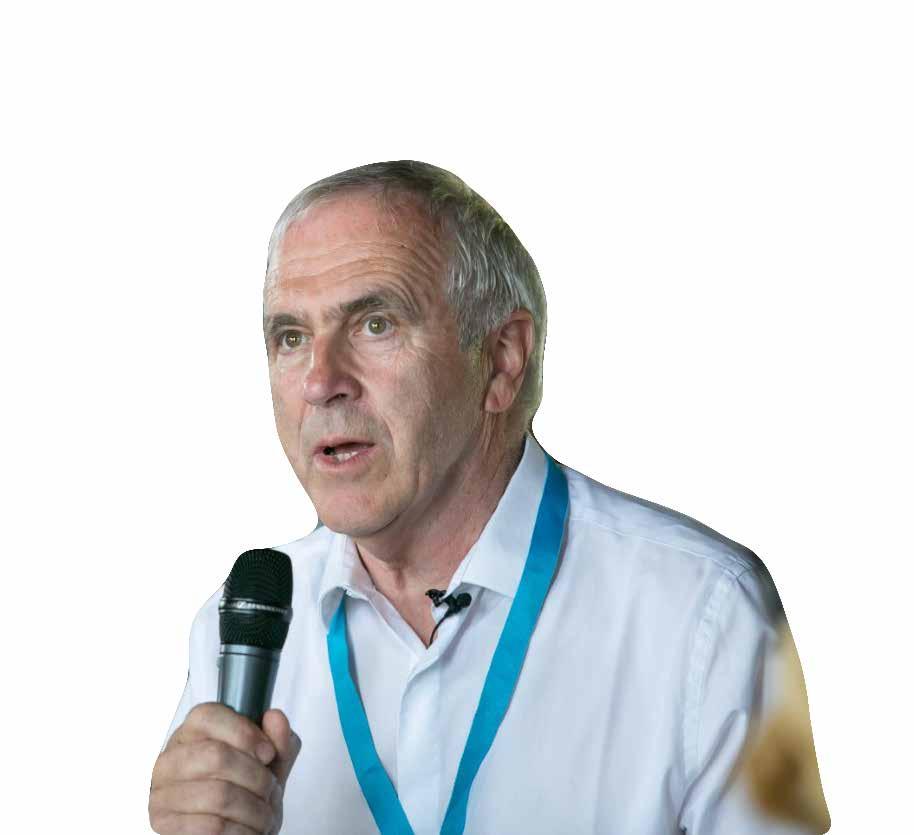
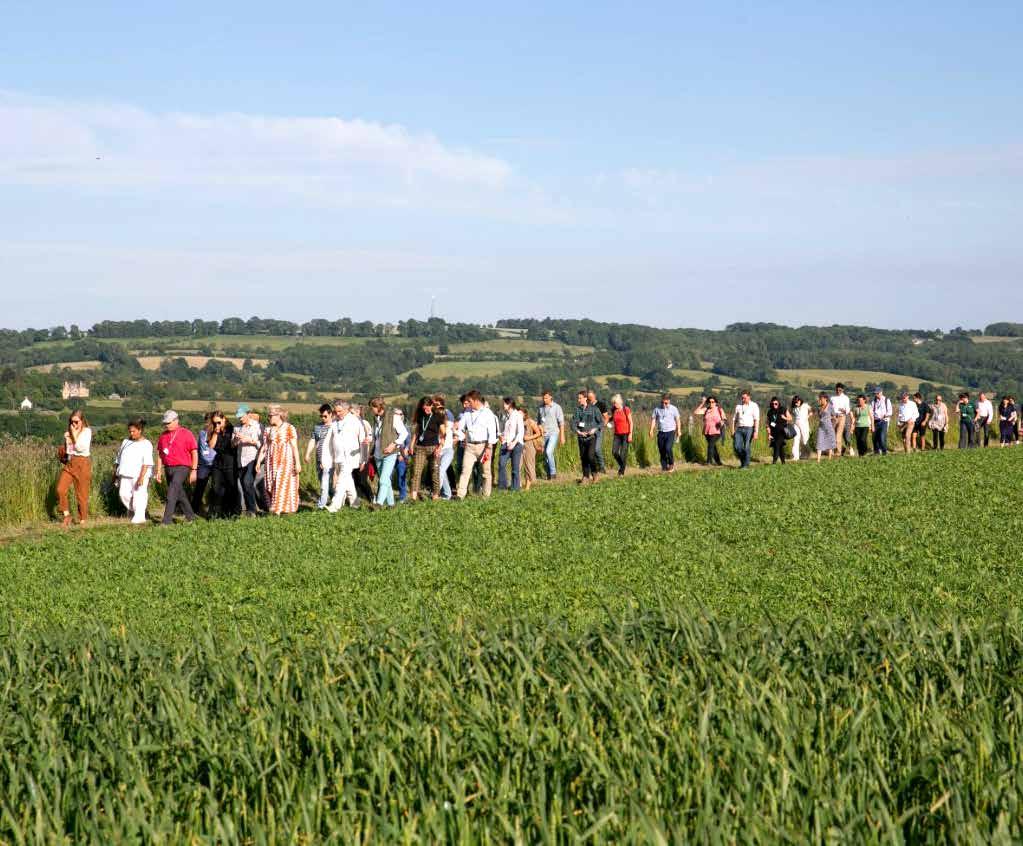
Wilderculture CIC
£500,000 (over 3 years)

Towards project costs associated with Sustainable Food Trust’s Global Farm Metric: a common framework for measuring and reporting on-farm sustainability.
The Sustainable Soils Alliance Community Interest Company
£48,000 (over 7 months)
Towards project costs relating to the Sustainable Soils Alliance’s role in the development of UK Farm Soil Carbon Code.
£60,000 (over 2 years)
Towards core costs to provide additional capacity to accelerate the provision of land management and sustainability advice to upland hill farmers.
Argyll and the Isles Coast and Countryside Trust (ACT)
£200,000 (over 3 years)
Towards core costs supporting ACT’s Peatland Initiative to enable smaller scale landholders to be able to contribute to peatland restoration.
Climate 2025 Limited (hosting RE-PEAT)
£60,000 (over 2 years)
Towards core costs for RE-PEAT to create a youth-led peatland paradigm shift through education, collaboration and a process of reimagining colonialist narratives that enable the exploitation and destruction of UK native peatlands.
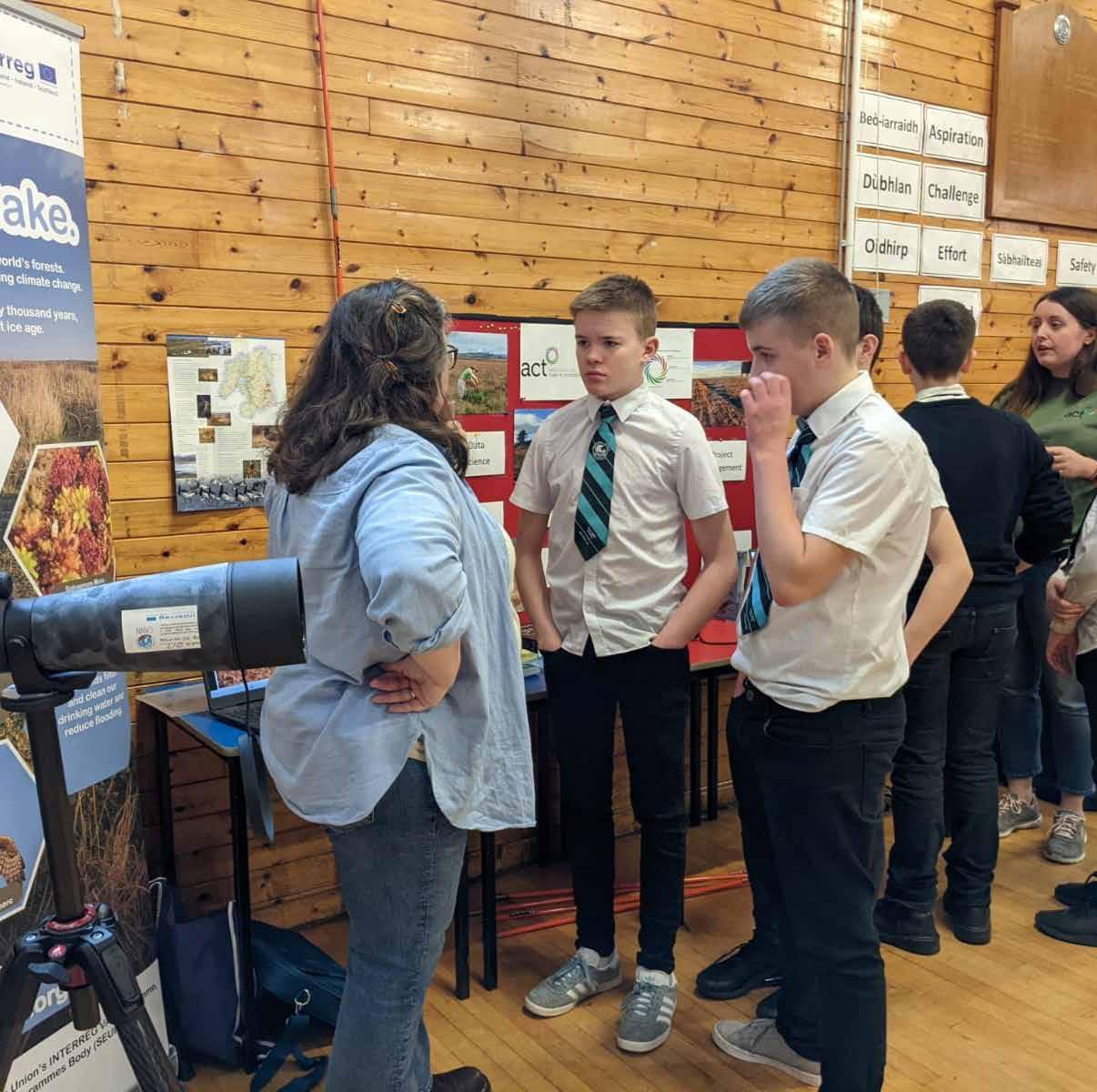
Crichton Carbon Centre
£34,200 (over 2 years)
Towards project costs using real world examples of investment in restoration of previously afforested peatlands to identify where this work is most appropriate for maximum environmental and economic benefit.
North Highland Initiative
£100,000 (over 2 years)
Towards project costs for the Flow Country Green Finance Initiative (GFI), aiming to develop a replicable model that can, at scale, restore peatlands, while offering socioeconomic opportunities.
Ulster Wildlife Trust



£279,375 (over 5 years)
Towards project costs for the next phase of peatlands work in Northern Ireland to support a new peatland restoration network.
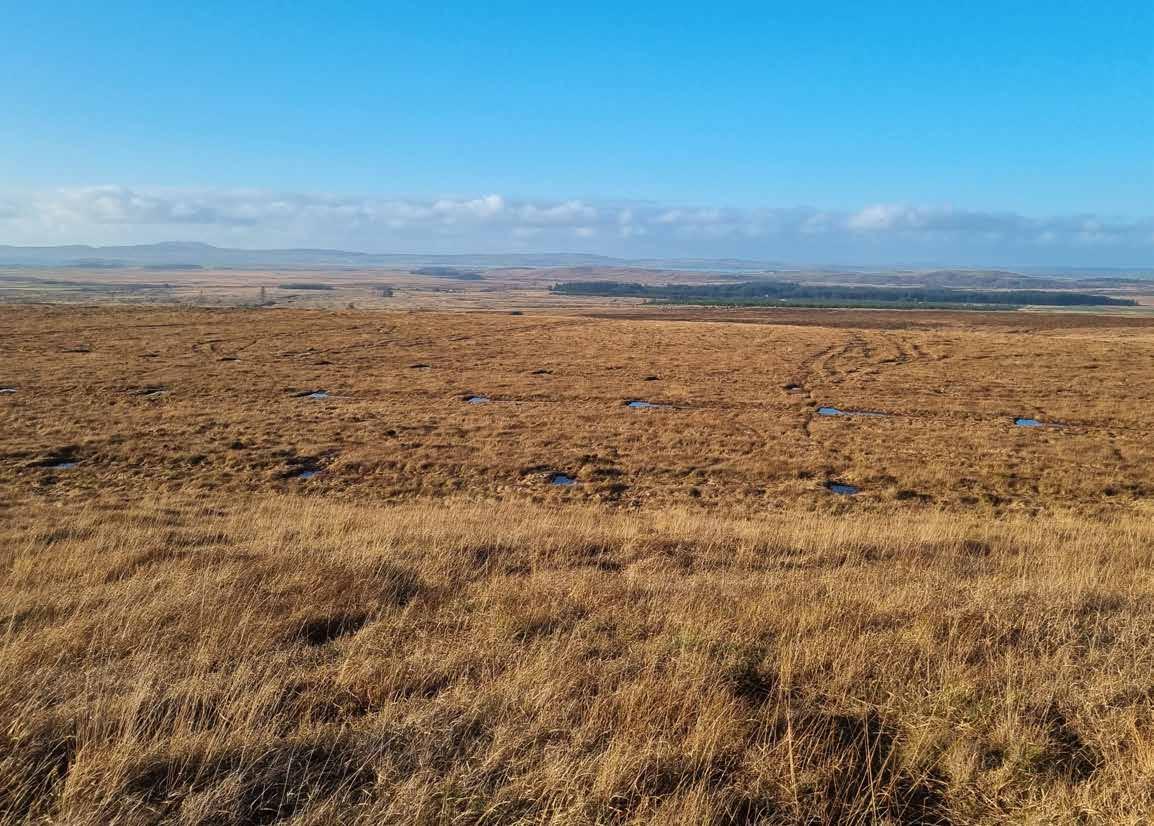
“We’ve managed to keep up to date with the rapidly developing natural capital investment element which is now part of the habitat restoration programmes we are involved with. Taking take this on board at the same time as staying true to our charitable objectives and vision and community led project delivery has been a challenging but fascinating rollercoaster!”
Argylland the Isles Coast and Countryside Trust
Bumblebee Conservation Trust
£250,000 (over 3 years)
Towards unrestricted core costs for Bumblebee Landscapes: Bigger, better and more connected.
CAMPAIGN FOR NATIONAL PARKS

Chartered Institute of Ecology and Environmental Management (CIEEM)
£59,800 (over 2 years)
Brighton & Hove Food Partnership
£170,000 (over 2 years)
Towards project costs of land use and demonstrating nature-friendly farming at a landscape scale on the chalk grassland surrounding Brighton and Hove.

British Trust for Ornithology
£650,000 (over 5 years)
Towards unrestricted core costs to improve the future prospects of UK nature, connect more people with nature and and make the British Trust for Ornithology more resilient.

£250,000 (over 5 years)
Towards unrestricted core costs of ensuring that everyone can enjoy and have a say in shaping the future of National Parks.
CDP Worldwide
£400,000 (over 3 years)
Towards core costs working on data driven action on biodiversity and climate with UK local authorities.
Towards project costs delivering Green Jobs for Nature, reaching out to currently under-represented groups to create a more diverse and inclusive workforce to deliver the jobs needed for nature’s recovery.

Cumbria Wildlife Trust

£250,000 (over 3 years)
Towards project costs Nature North: a coalition to integrate nature in North of England with levelling up and new models of investment.
Dark Matter Labs
£99,260 (over 2 years)
Towards project costs to fund a portfolio of Nature-based Solution projects in Glasgow and the Clyde Valley, with a primary focus on alleviating the region’s stormwater and flood risks.
“The work of Nature North could not be more important in helping to achieve our national ambition to leave our natural environment in a better state for future generations. It exemplifies the large-scale partnership working that it is increasingly clear is vital for meeting the huge challenges at hand, including the climate crisis and on-going depletion of the natural world.”
Tony Juniper, Chair of Natural England
Ecosystems Knowledge Network
£12,500 (over 6 months)
Towards project costs for Financing UK Nature Recovery’s state of the market.
FFCC Limited
£30,000 (over 1 year)
Towards project costs to encourage the UK Government to develop a comprehensive and inclusive Land Use Framework for England.
Green Finance Institute
£200,000 (over 1 year)
Towards project costs to assess the financial materiality of nature risks for the UK.
Heal Rewilding
£30,000 (over 1 year)
Towards core costs to create new sites across England for nature recovery, climate change action and wellbeing and regeneration for local communities.
Institute of Environmental Management & Assessment
£10,000 (over 6 months)
Towards project costs for the dissemination and next steps workshop for Financing UK Nature Coalition programme.
Loch Lomond & The Trossachs National Park
£94,544 (over 2 years)
Towards project costs for reviewing the range of green finance options for five landscape scale projects across the park which will collectively deliver the Future Nature Vision.
North Wales Wildlife Trust
£112,500 (over 2 years)
Towards project costs of the development phase of work on Anglesey Fens that will aim to restore 465 hectares (1,150 acres) of internationally important peatland.
Northern Ireland
Environment Link
£166,944 (over 3 years)
Towards project costs for a protected areas network in Northern Ireland to progress conservation and restoration of landscapes and seascapes.
Rewilding Britain
£200,000 (over 3 years)
Towards unrestricted core costs for Rewilding Britain to inspire, enhance, expand and connect a network of nature-positive land and marine projects.
Royal Society of Wildlife Trusts
£300,000 (over 3 years)
Towards unrestricted core costs to strengthen The Wildlife Trusts movement to take action for nature and climate, enable greater partnership working and support to communities across the UK.
RSPB (The Royal Society for the Protection of Birds)
£65,500 (over 2 years)
Towards project costs for the creation of a mechanism to ensure sustainable future funding for the conservation of Scotland’s Rainforest for the benefit of biodiversity, climate and local communities.
RSPB (The Royal Society for the Protection of Birds)
£98,662 (over 2 years)
Towards project costs exploring the delivery of nature positive biodiversity offsetting in Scotland.
Students Organising for Sustainability
£59,225 (over 1.5 years)
Towards project costs for the RACE Report: bringing Green 2.0 to the UK to catalyse the sustainability sector into action on race equity.
“175 charities, trusts and foundations working in or funding the environment,
sustainability and conservation sector signed up to The RACE Report in 2022 and 94 organisations submitted data to The RACE Report – supporting the progression of accountability, openness and transparency on diversity and inclusion in the sector.”
climate,Students Organising for Sustainability on the impact so far of The RACE Report.
The Borders Forest Trust
£150,000 (over 3 years)
Towards core costs for practical large-scale ecological restoration of damaged landscapes in Southern Scotland through new native woodland establishment.
The Langholm Initiative
£88,000 (over 1 year)
Towards project costs for making the most of existing buildings to support environmental restoration and social benefit around Langholm.
The Open University
£150,000 (over 2 years)
Towards core costs for the Floodplain Meadows Partnership.
Ulster Wildlife Trust
£295,000 (over 4 years)
Towards core costs to continue and expand collective efforts to further protect, conserve and restore nature at sea in Northern Ireland.
Ulster Wildlife Trust
£375,000 (over 5 years)
Towards unrestricted core costs underpinning work on blue carbon, water quality, peat, and nature friendly farming in Northern Ireland.
University of Exeter
£60,000 (over 1 year)
Towards project costs of Biodiversity
Net Gain, maximising outcomes for people and nature.
Wild in the City CIC
£200,000 (over 4 years)
Towards core costs to deliver a programme of activities to reduce the psychological barriers of racism that prevent people of colour accessing nature careers equitably.
WWF – UK
£365,000 (over 1 year)
Towards project costs for developing a People’s Plan for Nature.
Real Farming Trust
£565,000 (over 10 years)
A follow-on investment towards The Loans for Enlightened Agriculture Fund.
Sheffield and Rotherham Wildlife Trust
£940,000 (over 2 years)
An investment towards the purchase of Ughill Hall Farm.
Green Generation Fund
£1,000,000 (over 10 years)
An investment into the Green Generation Fund which invests into companies which deliver solutions for more sustainable, healthy and ethical consumption.
In addition to our three main aims, we support work that contributes to our impact goals across our aims by enabling a stronger, inclusive and innovative sector. This includes key infrastructure organisations and new ideas that unblock barriers, test new approaches or build movements for change.
Total funding approved in 2022 £829k
Applications towards A Sector Fit for the Future are by invitation only.
Our priorities in 2022 include:
• A diverse sector well equipped for the future
• Data and digital
• Funder collaboration and accountability
• Social and impact investing
Priority
A diverse sector well equipped for the future
Data and digital
No. of grants £ 1 1
Funder collaboration and accountability
2 £555k 2
£20k £134k £120k
Social and impact investing
360 Giving
£495,000 (over 3 years)
Towards core costs to support the implementation of a new strategy to raise the bar in grants data sharing, testing new approaches and inspiring and supporting the use of data.
Association of Charitable Foundations
£134,022 (over 20 months)
Towards project costs of the Funders Collaborative Hub, an initiative which aims to inspire and influence funders to think and work more collaboratively.
Charity Finance Group
£20,000 (over 1 year)
Towards unrestricted core costs for stabilising the business model.
Good Ancestor Movement
£60,000 (over 1 year)
Towards project costs to support Good Ancestor Movement’s work towards a more progressive wealth management industry and to end practices that promote inequality and economic injustice.
Investing for Good
£60,000 (over 3 years)
Towards project costs for a repayable grant facility to subsidise the start-up costs of new social investment
‘Partners’ engaged in Investing for Good’s regulatory hosting plus service.
£60,000 (over 1 year)
Towards project costs for a collective data standard for the youth sector, bringing together for the first time UK Youth, National Youth Association, Centre for Youth Impact and seven regional youth work networks to develop a common standard.

Using our experience and expertise, we work in partnership with other funders and organisations to co-design solutions and influence larger initiatives so that we can effect broader change.
This includes exploring new approaches to funding to increase our reach and share learning, examples of which are shared throughout this report.
In 2022, we also worked with partners on a range of delegated funds focusing on the power of museum collections to people; the refugee community sector in the UK; and strengthening creative organisations at the forefront of using popular culture to address systemic injustice.
“We’ve funded 17 museums to undertake participatory work with collections. We’ve supported applications from organisations ranging in size from volunteer-run to national museums and covering themes such as anti-racism, decolonisation and climate crisis awareness; and promoting inclusion, better health and wellbeing and community cohesion. We’ve also redesigned the fund to further develop sector practice supporting core costs for museums to hand over even more power to communities and support diversity, equity and inclusion.”
King’s Own Royal Regiment Museum
Migrant justice
British Refugee Council
£60,000 (over 1 year)
In 2022, the Programme for Afghan Refugee Community Support made 24 grants, totalling £416,332.
Arts and creativity making change
Comic Relief
£200,000 (over 2 years)
In 2022, the Power of Pop Fund made three grants, totalling £523,000.
Community-led art and creativity
Museums Association
We also give grants to the Museum sector through the Esmée Fairbairn Collections Fund, managed by Museums Association.
In 2022, 17 grants were made totalling £1,282,683
Birmingham Museums Trust
£89,990
Brunel Museum
£62,046
Food Museum
£77,500
Foundling Museum
£90,000
Horniman Museum & Gardens
£60,500
£53,363
Manchester Museum
£80,000
Museum of Cornish Life
£78,000
Museum of Hartlepool
£88,285
National Holocaust Centre
£80,360
National Space Centre
£87,000
New Forest Heritage
£80,000
Shakespeare Birthplace Trust
£70,200
The Science and Industry Museum
£66,000
Torfaen Museum Trust
£39,859
Tyne & Wear Archives and Museums
£90,000
Whithorn Trust
£89,580
When organisations have not yet developed robust financial and other processes we sometimes use a conduit to oversee the management of our funding or where we feel a grantee can benefit substantially from the additional resources that are available because of the relationship.
Arts and creativity making change
The following organisations received a grant via a conduit in 2022.
Please note these grants are also listed on pages 18 and 41.
Ideas Test
£105,000 (over 3 years)
Acting as conduit for Lyrici.
Ovalhouse Theatre Limited
£30,000 (over 1 year)
Acting as conduit for Alleyne&.
Peat Climate 2025
£60,000 (over 2 years)
Acting as conduit for RE-PEAT.
240Project
£10,000
40Tude Curing Colon Cancer
£10,000
Ashmolean Museum of Art and Archaeology
£10,000
Bind Food Waste Innovation Community Interest Company
£6,000
BLKOUT
£12,000
Bridewell Organic Gardens
£10,000
Britten Pears Arts
£15,000
Britten Sinfonia Ltd
£15,000
Burnham Overy Village Hall
£5,000
Canine Partners for Independence
£5,000
Care4Calais
£15,000
Chamber Orchestra of Europe
£5,000
Chamber Orchestra of Europe
£5,000
Chamber Orchestra of Europe
£10,000
Chamber Orchestra of Europe
£5,000
Charlbury Riverside Festival
£10,000
Chelsea Physic Garden
£5,000
Classics for All
£8,000
Comfort Cases UK
£5,000
Curlew Action
£15,000
De Montfort University
£10,000
Disasters Emergency Committee
£15,000
Disasters Emergency Committee
£15,000
Disasters Emergency Committee
£15,000
Disasters Emergency Committee
£15,000
Disasters Emergency Committee
£15,000
Disasters Emergency Committee
£15,000
Disasters Emergency Committee
£15,000
Durrell Wildlife Conservation Trust – UK
£15,000
East London Music Group
£8,000
Elevate Young Minds CIC
£15,000
Emmaus Oxford
£7,500
Empty Kitchens, Full Hearts. CIC
£15,000
English Touring Opera
£15,000
Family Holiday Charity
£8,000
Forward Arts Foundation
£7,500
Forward Arts Foundation
£7,500
Friends of Friendless Churches Limited
£8,000
Golden Triangle Learning CIC £5,000
Guy’s and St Thomas’ Foundation
£5,000
Hazara Charitable Trust £15,000
Institute for the Future of Work £15,000
Involve Kent £10,000
Jewish Book Council
£5,000
Kaleidoscope Trust
£10,000
King’s Somborne Village Hall
£10,000
LIFEbeat UK
£2,500
Live Theatre £7,500
London Handel Society Limited
£10,000
Low Carbon Oxford North £5,000
Maggie’s Cancer Caring Centres
£7,500
MamaSuze CIC
£15,000
Migration Museum Project £10,000
Mimosa House CIC
£10,000
National Literacy Trust £12,000
Nidderdale AONB
£1,000
Nordoff Robbins Music Therapy
£10,000
North Yorkshire Hospice Care
£2,000
Northern Ballet Limited
£1,500
NW5 Community Play Project
£10,000
Olympias Music Foundation £10,000
Orchestra of the Age of Enlightenment
£10,000
Oxford Food Hub £10,000
Oxford Lieder £7,500
Oxford Ornithological Society £7,500
Peace of Mind £2,500
People Know How
£15,000
Photography Oxford
£5,000
Picture Hooks
£5,000
Place2Be
£12,000
Porchlight
£8,000
Promise Works Ltd
£5,000
Royal Opera House Covent Garden Foundation
£10,000
Royal Trinity Hospice
£10,000
Salusbury World
£8,000
Saxon Shore Early Music
Kenardington
£8,000
Science Museum
£5,000
Sheerness Dockyard Preservation Trust
£10,000
Shelter, National Campaign for Homeless People Limited
£5,000
Smart Works
£5,000
South Downs National Park Trust
£10,000
Southern Sinfonia
£5,000
St. Martin’s Centre Partnership
£2,500
Sustainable Food Trust
£3,000
Thanington Neighbourhood Resource Centre
£2,000
The Advocacy Academy
£5,000
The Branch Trust
£10,000
The Chinese Centre (North of England) LTD
£3,000
The Clod Ensemble
£12,000
The Country Trust
£3,500
The Egmont Trust
£5,000
The English Concert
£15,000
The Global Returns Project Limited
£5,000
The Happy Baby Community
£15,000
The House of Fairytales
£5,000
The London Orphan Asylum (Reed’s School)
£5,000
The Mulberry Bush Organisation Ltd
£2,000
The National Trust
£15,000
The Oxford Playhouse Trust
£10,000
The Parochial Church Council Of The Ecclesiastical Parish Of St Andrews
£10,000
The People’s People CIC
£1,000
The Percy Hedley Foundation
£5,000
The Royal Drawing School
£5,000
The Runnymede Trust
£5,000
The Social Bite Fund
£15,000
The Super Power Agency
£15,000
The Three Rivers Learning Trust
£5,000
The Unicorn School for the Dyslexic Child
£15,000
The Wheelyboat Trust
£10,000
The Whitley Fund for Nature
£5,000
Triangle Arts Trust
£8,000
Tribe Arts
£10,000
Ubele Initiative
£15,000
Ubele Initiative
£10,000
University of Sheffield
£10,000
West End Women and Girls Centre CIO
£10,000
Wood Street Mission
£3,000
Worcester College
£15,000
Workplace Foundation
£10,000
WWF – UK
£10,000
Yellow Submarine Holidays
£5,000
Yorkshire Wildlife Trust
£10,000
Disasters Emergency Committee
£250,000
Towards project costs for the Pakistan Floods Appeal.
Disasters Emergency Committee
£350,000
Towards project costs for the Ukraine Humanitarian Crisis appeal.
Hammersmith, Fulham, Ealing and Hounslow Mind
£10,000
Towards unrestricted core costs and in memory of Chris Varco, who worked on Esmée’s responsible investing approach for many years, and nominated by his family.
John Ellerman Foundation
£60,000
Towards project costs to John Ellerman Foundation for a shared funder collaboration: Overseas Territories Biodiversity (exceptional pilot grant).
Winston’s Wish
£10,000
Towards unrestricted core costs and in memory of Chris Varco, who worked on Esmée’s responsible investing approach for many years, and nominated by his family.
Esmée Fairbairn Foundation exists and operates for the public benefit. Through setting its strategy and through its funding the Foundation has focused on creating social and environmental impact to improve our natural world, secure a fairer future and strengthen the bonds between communities in the UK. In determining its strategy and in the administration of the Foundation generally, the Trustees have paid due regard to the guidance published by the Charity Commission under section 4 of the Charities Act 2011.
In October 2020, the Foundation launched its Strategic Plan 2020–25. A summary of this can be found on the Foundation’s website.
The Foundation’s primary interests are A Fairer Future, Creative, Confident Communities and Our Natural World. Pages 7 to 15 give an overview of funding, a list of all grants and social investments made in 2022 is on pages 16 to 51.
The public benefit created by the Foundation’s grant-making and social investment is demonstrated in this report through listing of grants and social investments that we have made.
The achievements of the Foundation and its impact on beneficiaries, as well as plans for future periods; are outlined in the Chair’s statement on page 4, Chief Executive’s report on pages 5 and 6, the funding overview on pages 7 to 15, the funding priorities and details of funding on pages 16 to 51.
Our values act as a guide for staff and Trustees about how we work at Esmée. They are intended to provide a frame of reference for taking actions and making decisions at every level.
The Foundation’s finance and investment policies are intended to provide long-term stability and liquidity sufficient for the financing of the Foundation’s grants and social investments while maintaining the real value of the endowment.
The Foundation has an Investment Policy Statement that sets out the long-term investment objective, risk-profile, strategic asset allocation and investment restrictions, as well as encompassing our policies on sustainable investing. This is reviewed annually. The Foundation’s strategic asset allocation reflects a total-return objective without specific focus on income-generating investments. This approach means that we consider all sources of return, including interest, dividends, capital distributions from funds, and realised and unrealised gains and losses. Income alone would not usually meet all of our future spending needs.
Funding targets are arrived at with consideration given to the average value of the investment portfolio, but may be adjusted to take account of need and operational capacity.
Funding targets may be over or under-spent in an individual year. The Foundation’s support and governance spend is set by reference to total spend levels to ensure it remains reasonable and proportionate.
All funds held by the Foundation are unrestricted and available to the Foundation to apply for the general purposes of the Foundation as set out in its governing document. The Foundation aims to achieve a total return of RPI +4% in order to meet its spending requirements. At the year-end the value of reserves held was £1,268m.
During 2022, the Foundation spent £41.4m (2021: £56.4m) on grantmaking, programme related investments, and mixed motive investments. Support spend was £3.6m (2021: £3.3m), or 7.9% (2021: 5.6%) of our total spend. Grantmaking spend for the year was £36.9m (2021: £51.3m). Mixed Motive Investment drawdowns during the year amounted to £0.2m (2021: £0).
Programme related investments committed to in 2022 were £2.7m
(2021: £4.6m) across 4 investments (2021: 11). Drawdowns during the year amounted to £4.3m (2021: £4.7m). At the end of the year the Foundation’s programme related investment portfolio was £17.8m (2021: £20.2m), with an additional £5.0m (2021: £6.1m) committed but not yet drawn. The draw down limit for our social investment portfolio is £45.0m.
The market value of the Foundation’s investments at the end of 2022 was £1.303bn (2021: £1.482bn), a decrease of £178.3m after spending. The portfolio’s total return of -9.6% in 2022 (2021: 31.1%) compared to the Foundation’s long-term investment objective (RPI+4%) which was up 17.9% during the year (versus 11.8% in 2021).
Results in any one year need to be seen in the context of progress over longer time horizons and we continue to look for managers with a strong team, a clear approach to stock selection and a thoughtful, long-term approach to investment.
Looking back over one year, three years, five years and since inception, the performance on an annualised basis of the portfolio against our long-term investment objectives is as per the table below.
Financial markets were weak in 2022 on the back of high inflation, raised energy prices and geopolitical events including Russia’s invasion of Ukraine. The concerns over high inflation led to price declines across both equities and bond markets which presented challenges for any investor constructing a balanced portfolio.
Nearly all equity sectors were down in absolute terms during the year with the exception of energy. Investors focusing on growth and quality stocks were particularly hard hit as were those with holdings in the IT and consumer discretionary sectors.
Our main global equity funds fell substantially during the year, more than twice as much as their benchmark which was down 7.8%. Our non-core global funds also fell more than their benchmark but, given our bias towards funds investing in growth stocks, these results were not too surprising. We have been using the market correction to look
for opportunities to deploy our cash balance which has been higher than average for some time now.
Our smaller hedge fund allocation provided some diversification benefits against our equity market exposure as did the private investment portfolio which represents around 35% of the overall fund. However the underlying positions in these latter funds take longer to re-price due to their illiquidity.
The Foundation’s grant funding and operational costs are in sterling however the majority of our investments are not, and the fund benefitted from the relative strength of USD versus GBP. We continue
to run a passive currency hedging programme which reduces the impact of currency fluctuations on performance and has the effect of lifting the investment portfolio’s effective exposure to sterling.
In terms of the outlook, corporate earnings are likely to remain under pressure due to higher borrowing costs, pressure on profit margins and slower global growth. But equity valuations have declined since their peak in 2021 and we continue to look for innovative companies and higher quality businesses with pricing power that we can hold over the long term. Government bonds and credit are also now increasingly of interest. We have struggled to own fixed income for some time due to high valuations but, with yields much more attractive than a year ago, we are re-evaluating opportunities.
See the second table on page 54 for the portfolio’s asset allocation at the end of the year.
We are aware that the Foundation’s mission or its credibility may be undermined if we invest in businesses whose activities undermine our values and grant-making objectives.
We continue to transition our portfolio to managers focused on sustainability who place ESG (environmental, social and governance) considerations at the centre of their investment process. We avoid investing in new funds which might have holdings that conflict directly with the outcomes of our funding, and we are continually looking to upgrade our list of managers to those with a strong approach to sustainable investing.
Since 2017, we have had a £25m allocation within our investment portfolio for funds that we hope will achieve enhanced ESG impact alongside financial return. During 2022, we took the decision to increase this allocation up to a 5% of our overall fund. It continues to focus on funds which may not fit within our mainstream investments due to size, focus or risk profile.
In 2022, we made our first investments into a £10m impact allocation, managed by our social investment team who are working in conjunction with our investment consultants. We will use this pilot to inform our longer-term investment strategy. The starting point for our impact investing decisions is the intent
to generate positive, measurable social and environmental outcomes (the impact) alongside the achievement of financial returns, both moving in lockstep. Investments to date have included a fund focusing on innovation in the food sector and another tacking issues such as job inequalities across the UK. Within our investment portfolio we aim to be proactive asset owners by engaging with companies on issues that are aligned with our funding priorities. We work with other foundations and investors through the Charities Responsible Investment Network and look for opportunities to promote corporate behaviour which is in the interests of long term shareholders and we join various collaborative investor engagement initiatives where they align with our strategic aims. Recent examples have included an initiative encouraging companies in the food sector to reduce environmental risks associated with manufacturing facilities and a joint letter to European banks asking them to end funding for fossil fuel projects.
The Foundation is a signatory to the United Nations’ Principles for Responsible Investment (UNPRI)
and to the UK Funder Commitment on Climate Change. We are one of a growing number of foundations who recognise that the growing climate emergency is a serious risk to the pursuit of our charitable aims.
We have made a commitment that our investment portfolio will be net zero in terms of carbon emissions by 2040 at the latest. We are working with our investment advisors to achieve this and have started working on four priorities.
1. Invest in “climate solutions” which enable emissions to be avoided or reduced.
2. Be a supportive shareholder to higher emissions businesses which have set a plausible path to Paris alignment for their own activities and holding them to account for delivery.
3. Ac tively using proxy voting and engagement to encourage businesses to adopt appropriate plans to decarbonise, where these are absent, as in most cases today.
4. Support efficient capital allocation in each of the preceding activities. Activities during 2022 included gathering data from our managers
to establish their current approach on Net Zero. We conducted baseline assessments of holdings with Paris aligned targets and made an investment in a private renewable infrastructure fund.
Our Trustee Board also recently updated the terms of reference for our investment committee to make it clear that, as well as focusing on our financial return targets, we will take sustainability into account whenever we make a decision in the main portfolio. In light of this, we will also be updating our investment policy statement in 2023.
The Trustee Board is responsible for the oversight of the risks faced by the Foundation. The Trustee Board and Audit and Risk Committee regularly review the Foundation’s risk position, internal controls assessment and compliance with relevant statutory and finance regulations.
The Foundation has a riskmanagement process designed to identify the major risks that could impact on the aims in the Foundation’s Strategic Plan.
This process identifies the major risks the Foundation faces, the likelihood of occurrence, the significance of the risk, and any mitigating controls that are in place. It also seeks to identify any actions and resources required to manage these risks further.
The Foundation’s investment activities are its main financial risk. This risk is managed, with the support of investment advisers, through: regular review of our investment policy; management of strategic asset allocation; risk measurement and reporting; independent valuation and performance reporting; diversification across a broad range of asset classes, geographies, investment managers and investment strategies; and ongoing market and manager updates and due diligence.
The levels of manager concentration, currency exposure, leverage and liquidity are also key factors in managing the risks of the investment portfolio. Policies and restrictions to help manage these risks are included in the Investment Policy Statement.
The operation of Esmée Fairbairn Foundation is governed by a Charity Commission Scheme, dated 14 January 2002, which enables the assets to be applied by the Trustees at their discretion for general charitable purposes. The Charity Commission approved an incorporation of the Trustee body on 16 June 2008 in the name of The Trustees of Esmée Fairbairn Foundation.
The Foundation is a charity registered in England and Wales, number 200051.
The Foundation’s Trustees are listed on page 73 of this report. The Trustee Board meets six times each year to set and oversee the delivery of the Foundation’s strategy. A number of Trustee committees support the work of the Foundation throughout the year
The Foundation has a clear organisational structure with documented lines of authority and delegation, which is reviewed regularly by the Audit and Risk Committee and the Trustee Board. The Foundation also has segregation of duties with regard to governance, management, grant-making, social investments, finance and investment.
Procedures are in place for documenting decisions, actions and issues.
An induction programme is put in place for new Trustees.
The Audit and Risk Committee reviews and recommends to the Trustee Board systems of internal control on financial and governance issues and oversees risk management. It also reviews the draft Annual Report and Accounts and meets with the Foundation’s external auditors.
The Finance and Administration Committee reviews and recommends to the Trustee Board annual budgets, staff remuneration and benefits. It also oversees major property, IT, governance and other projects.
The salaries of the senior management team are set by the Finance and Administration Committee and includes reference to peers and other comparators.
The Investment Committee formulates investment policy, oversees its implementation, manages overall asset allocation, monitors investment performance and reports to the Trustee Board.
The Nominations Committee makes recommendations to the Trustee Board on the appointment of new Trustees.
An Executive Committee takes decisions on grants up to £60,000. An Approvals Committee, comprising Trustee and Executive members, takes decisions on grants and awards up to £200,000 and social investments up to £400,000. All decisions on grants and awards over £200,000 and social investments over £400,000 go to the Trustee Board.
In respect of the Trustees’ Annual Report and the financial statements

Under charity law, the trustees are responsible for preparing a Trustees’ Annual Report and financial statements in accordance with applicable law and regulations.
The trustees are required to prepare the charity financial statements in accordance with UK Accounting Standards, including FRS 102 The Financial Reporting Standard applicable in the UK and Republic of Ireland.
The charity’s financial statements are required by law to give a true and fair view of the state of affairs of the charity and its incoming resources and application of resources for that period.
In preparing these financial statements, generally accepted accounting practice entails that the trustees:
• select suitable accounting policies and then apply them consistently;
• make judgements and estimates that are reasonable and prudent;
• st ate whether applicable UK Accounting Standards and the Statement of Recommended Practice have been followed, subject to any material departures disclosed and explained in the charity financial statements;
• st ate whether the charity financial statements comply with the Scheme rules, subject to any material departures disclosed and explained in the financial statements;
• assess the charity’s ability to continue as a going concern, disclosing, as applicable, matters related to going concern; and
• use the going concern basis of accounting unless they either intend to liquidate the charity or to cease operations or have no realistic alternative but to do so.
The trustees are required to act in accordance with the Scheme rules of the charity, within the framework of trust law. They are responsible for keeping accounting records which are sufficient to show and explain the charity’s transactions and disclose at any time, with reasonable accuracy, the financial position of the charity at that time, and to enable the trustees to ensure that, where any statements of accounts are prepared by them under section 132(1) of the Charities Act 2011, those statements of accounts comply with the requirements of regulations under that provision. They are responsible for such internal control as they determine is necessary to enable the preparation of financial statements that are free from material misstatement, whether
due to fraud or error, and have general responsibility for taking such steps as are reasonably open to them to safeguard the assets of the charity and to prevent and detect fraud and other irregularities.
The trustees are responsible for the maintenance and integrity of the financial and other information included on the charity’s website. Legislation in the UK governing the preparation and dissemination of financial statements may differ from legislation in other jurisdictions.
Beatrice Hollond Chair 14 July2023
We have audited the financial statements of Esmée Fairbairn Foundation (“the charity”) for the year ended 31 December 2022, which comprise the Statement of Financial Activities, Balance Sheet, Cash Flow Statement and related notes, including the accounting policies in note 1.
In our opinion the financial statements:
• give a true and fair view of the state of the charity’s affairs as at 31 December 2022 and of its incoming resources and application of resources for the year then ended;
• have been properly prepared in accordance with UK accounting standards, including FRS 102
The Financial Reporting Standard applicable in the UK and Republic of Ireland; and
• have been prepared in accordance with the requirements of the Charities Act 2011.
We have been appointed as auditor under section 144 of the Charities Act 2011 (or its predecessors) and report in accordance with regulations made under section 154 of that Act.
We conducted our audit in accordance with International Standards on Auditing (UK) (“ISAs (UK)”) and applicable law. Our responsibilities are described below. We have fulfilled our ethical responsibilities under, and are independent of the charity in accordance with, UK ethical requirements including the FRC Ethical Standard. We believe that the audit evidence we have obtained is a sufficient and appropriate basis for our opinion.
The trustees have prepared the financial statements on the going concern basis as they do not intend to liquidate the charity or to cease their operations, and as they have concluded that the charity’s financial position means that this is realistic. They have also concluded that there are no material uncertainties that could have cast significant doubt over their ability to continue as a going concern for at least a year from the date of approval of the financial statements (“the going concern period”).
In our evaluation of the trustees’ conclusions, we considered the inherent risks to the charity’s business model and analysed how those risks might affect the charity’s financial resources or ability to continue operations over the going concern period.
Our conclusions based on this work:
• We consider that the trustees’ use of the going concern basis of accounting in the preparation of the financial statements is appropriate.
• We have not identified, and concur with the trustees’ assessment that there is not, a material uncertainty related to events or conditions that, individually or collectively, may cast significant doubt on the charity’s ability to continue as a going concern for the going concern period.
However, as we cannot predict all future events or conditions and as subsequent events may result in outcomes that are inconsistent with judgements that were reasonable at the time they were made, the above conclusions are not a guarantee that the charity will continue in operation.
To identify risks of material misstatement due to fraud (“fraud risks”) we assessed events or conditions that could indicate an incentive or pressure to commit fraud or provide an opportunity to commit fraud. Our risk assessment procedures included:
• Enquiring of Trustees, the audit committee and inspection of policy documentation as to the Charities high-level policies and procedures to prevent and detect fraud as well as whether they have knowledge of any actual, suspected or alleged fraud.
• Reading Trustees’ meetings, investment committee strategy meetings and audit and risk committee meetings minutes.
• Considering remuneration incentive schemes and performance targets for management.
We communicated identified fraud risks throughout the audit team and remained alert to any indications of fraud throughout the audit.
As required by auditing standards, and taking into account our overall knowledge of the control environment, we perform procedures to address the risk of management override of controls, in particular the risk that management may be in a position to make inappropriate accounting entries. On this audit we do not believe there is a fraud risk related to revenue recognition because the revenue is non-judgmental and straightforward, with limited opportunity for manipulation.
We did not identify any additional fraud risks.
We performed procedures including identifying journal entries to test based on risk criteria and comparing the identified entries to supporting documentation. These included those posted by senior finance management/ those posted and approved by the same user/ those posted to unusual accounts.
We identified areas of laws and regulations that could reasonably be expected to have a material effect on the financial statements from our general commercial and sector experience ,and through discussion with management (as required by auditing standards) and discussed with management the policies and procedures regarding compliance with laws and regulations.
We communicated identified laws and regulations throughout our team and remained alert to any indications of non-compliance throughout the audit.
The potential effect of these laws and regulations on the financial statements varies considerably.
Firstly, the Charity is subject to laws and regulations that directly affect the financial statements including financial reporting legislation (including related companies’ legislation), taxation legislation and the Charities Act legislation and we assessed the extent of compliance
with these laws and regulations as part of our procedures on the related financial statement items.
Secondly, the Charity is subject to many other laws and regulations where the consequences of noncompliance could have a material effect on amounts or disclosures in the financial statements, for instance through the imposition of fines or litigation or the loss of the Charity’s license to operate. We identified the following areas as those most likely to have such an effect: health and safety, anti-bribery, employment law, data protection, anti-money laundering and certain aspects of company legislation recognising the nature of the Charities activities. Auditing standards limit the required audit procedures to identify noncompliance with these laws and regulations to enquiry of management, inspection of regulatory and legal correspondence, if any. Therefore, if a breach of operational regulations is not disclosed to us or evident from relevant correspondence, an audit will not detect that breach.
Owing to the inherent limitations of an audit, there is an unavoidable risk that we may not have detected some material misstatements in the financial statements, even though we have properly planned and performed our audit in accordance with auditing standards. For example, the further removed non-compliance with laws and regulations is from the events and transactions reflected in the financial statements, the less likely the inherently limited procedures required by auditing standards would identify it.
In addition, as with any audit, there remained a higher risk of nondetection of fraud, as these may involve collusion, forgery, intentional omissions, misrepresentations, or the override of internal controls. Our audit procedures are designed to detect material misstatement. We are not responsible for preventing non-compliance or fraud and cannot be expected to detect non-compliance with all laws and regulations.
The trustees are responsible for the other information, which comprises the Trustees’ Annual Report; Overview and Funding. Our opinion on the financial statements does not cover the other information and, accordingly, we do not express an audit opinion or, except as explicitly stated below, any form of assurance conclusion thereon.
Our responsibility is to read the other information and, in doing so, consider whether, based on our financial statements audit work, the information therein is materially misstated or inconsistent with the financial statements or our audit knowledge.
We are required to report to you if:
• based solely on that work, we have identified material misstatements in the other information; or
• in our opinion, the information given in the Trustees’ Annual Report is inconsistent in any material respect with the financial statements.
We have nothing to report in these respects.
Under the Charities Act 2011 we re required to report to you if, in our opinion:
• the charity has not kept sufficient accounting records; or
• the financial statements are not in agreement with the accounting records; or
• we have not received all the information and explanations we require for our audit.
We have nothing to report in these respects.
As explained more fully in their statement set out on page 57, the trustees are responsible for: the preparation of financial statements which give a true and fair view; such internal control as they determine is necessary to enable the preparation of financial statements that are free from material misstatement, whether due to fraud or error; assessing the charity’s ability to continue as a going concern, disclosing, as applicable, matters related to going concern; and using the going concern basis of accounting unless they either intend to liquidate the charity or to cease operations, or have no realistic alternative but to do so.
Our objectives are to obtain reasonable assurance about whether the financial statements as a whole are free from material misstatement, whether due to fraud or error, and to issue our opinion in an auditor’s report. Reasonable assurance is a high level of assurance, but does not guarantee that an audit conducted in accordance with ISAs (UK) will always detect a material misstatement when it exists. Misstatements can arise from fraud or error and are considered material if, individually or in aggregate, they could reasonably be expected to influence the economic decisions of users taken on the basis of the financial statements.
A fuller description of our responsibilities is provided on the FRC’s website.
The purpose of our audit work and to whom we owe our responsibilities
This report is made solely to the charity’s trustees as a body, in accordance with section 144 of the Charities Act 2011 (or its predecessors) and regulations made under section 154 of that Act. Our audit work has been undertaken so that we might state to the charity’s trustees those matters we are required to state to them in an auditor’s report and for no other purpose. To the fullest extent permitted by law, we do not accept or assume responsibility to anyone other than the charity and its trustees, as a body, for our audit work, for this report, or for the opinions we have formed.
For and on behalf of KPMG LLP, StatutoryAuditor
14 July 2023
Chartered Accountants
KPMG LLP is eligible to act as an auditor in terms of section 1212 of the Companies Act 2006
15 Canada Square London
E14 5GL
For the year ended 31 December 2022
At 31 December 2022

The notes on pages 63 to 72 form part of these accounts. The Foundation has no recognised gains or losses other than the net movement in funds for the year.
The notes on pages 63 to 72 form part of these accounts.
The accounts were approved and authorised for issue by the Trustee Board on 14 July 2023. The net (loss)/income and resulting net movement in funds in each of the financial years are from continuing operations.
Signed
Beatrice Hollond ChairFor the year ended 31 December 2022
The notes on pages 63 to 72 form part of these accounts.
Legal status
The Foundation is a charity registered in England and Wales, number 200051. The Foundation’s registered address is 210 Pentonville Rd, London, N1 9JY. The operation of Esmée Fairbairn Foundation is governed by a Charity Commission Scheme, dated 14 January 2002, which enables the assets to be applied by the Trustees at their discretion for general charitable purposes. The Charity Commission approved an incorporation of the Trustee body on 16 June 2008 in the name of The Trustees of Esmée Fairbairn Foundation.
The accounts have been prepared in accordance with the Statement of Recommended Practice: Accounting and Reporting by Charities preparing their accounts in accordance with the Financial Reporting Standard applicable in the UK and Republic of Ireland (FRS 102) issued on August 2014 (the amendments to FRS 102 issued
in July 2015 and effective immediately have been applied), and the Charities Act 2011 and UK Generally Accepted Practice as it applies including update bulletin 1 applicable from 1 January 2016 and update bulletin 2 applicable from 1 January 2019.
The accounts have been prepared to give a ‘true and fair’ view and have departed from the Charities (Accounts and Reports) Regulations 2008 only to the extent required to provide a ‘true and fair view’.
The Foundation meets the definition of a public benefit entity under FRS 102.
The presentation currency of these financial statements is sterling. All amounts in the financial statements have been rounded to the nearest £1,000.
Judgements made by the Trustees, in the application of these accounting policies that have significant effect on the financial statements and estimates with a significant risk of material adjustment in the next year are deemed to be in relation to the valuation of investments and are discussed below.
The Trustees prepared the financial statements on a going concern basis. The Foundation is in a net current liabilities position, with the largest proportion of the current liabilities being the Grant Commitment creditors. The Trustees consider that the Grant Commitments can be met with the liquidity available in the investment portfolio.
As part of the going concern assessment, the Trustees also performed stress testing using severe but plausible scenarios, including a 40% market value decline in global equities. The Trustees are satisfied that under that scenario, the Foundation has adequate resources to continue in operational existence for at least 12 months from the date of the approval of these financial statements. As such, the Trustees continued to adopt the going concern basis of accounting in preparing the annual financial statements.
Incoming resources are recognised in the Statement of Financial Activities in the period in which the Foundation becomes entitled to receipt.
Dividend income and related tax credits are recognised from the exdividend date when they become receivable.
Direct costs of generating funds, charitable activities and support costs are charged to the relevant category or activity according to the area to which the expenditure relates. Support costs incurred –that relate to more than one cost category are apportioned based on the number of full-time equivalent staff allocated to that activity. Grants are recognised as expenditure in the year in which they are approved, and such approval has been communicated to the recipients, except to the extent that they are subject to conditions that enable the Foundation to revoke the award.
The Foundation operates a defined contribution group personal pension scheme for employees. The assets of the scheme are held separately from those of the Foundation. The annual contributions are charged to the Statement of Financial Activities.
Employee benefits include all costs incurred by the charity in exchange for the services of its employees.
Expenditure is recognised for all employee benefits resulting from their service to the charity during the reporting period unless the staff costs have been capitalised as part of the cost of an asset.
Irrecoverable Value Added Tax (VAT) is included in the Statement of Financial Activities within the expenditure to which it relates.
The Foundation is considered to pass the tests set out in Paragraph 1 Schedule 6 Finance Act 2010 and therefore it meets the definition of a charitable trust for UK income tax purposes. Accordingly, the charity is potentially exempt from UK taxation in respect of income or capital gains received within categories covered by Part 10 Income Tax Act 2007 or Section 256 of the Taxation of Chargeable Gains Act 1992, to the extent that such income or gains are applied exclusively to charitable purposes.
To the extent that the Foundation engages in overseas activity, or derives income from overseas, it may incur a foreign tax liability depending on the application of the tax legislation in the relevant jurisdiction.
Tangible fixed assets are included in the balance sheet at cost less accumulated depreciation. Leasehold improvements are depreciated over the term of the lease. Office and computer equipment is depreciated at between 20% and 33% per annum. Depreciation is charged on a straight-line basis over the assets’ useful lives.
Assets obtained under finance leases are capitalised as tangible fixed assets and depreciated over their useful lives. Finance leases are those where substantially all of the benefits and risks of ownership are assumed by the Foundation. Obligations under such agreements are included in creditors net of the finance charge allocated to future periods. The finance element of the rental payments is charged to the Statement of Financial Activities over the period of the lease.
All other leases are operating leases. Operating lease annual rentals are charged to the Statement of Financial Activities on a straight-line basis over the term of the lease.
Debtors and creditors are recognised at transaction price.
Cash and cash equivalents comprise cash held at bank.
Alternative investments are valued at the Foundation’s best estimate of fair value as follows:
Hedge funds and collective investment schemes are valued by reference to the market value of their underlying investments. These valuations are provided by the third party fund administrators and are subject either to independent valuation or annual audit.
Private equity investments are held through funds managed by private equity groups. As there is no identifiable market price for private equity funds, these funds are included at the most recent valuations from the private equity groups where:
i. the private equity group provides a fair value that complies with the International Private Equity and Venture Capital Valuation Guidelines; or
ii.the private equity group provides valuations that comply with International Financial Reporting Standards or US GAAP.
Where a valuation is not available at the balance sheet date, the most recent valuation from the private equity group is used, adjusted for cashflows and foreign exchange movements and any impairment between the most recent valuation and the balance sheet date.
Other investments are stated at fair value, the basis of fair value being the market value of the underlying investments held. These valuations are provided by the fund managers and are subject either to independent valuation or annual audit.
Derivatives are recognised in the Balance Sheet at fair value. Where the Foundation uses forward currency contracts to reduce currency exposure in its investment portfolio the fair value of these forward exchange contracts is estimated by using the gain or loss that would arise from closing the contract at the balance sheet date. Managers of segregated funds may enter into derivatives as part of their portfolio risk management, fair values of these derivatives are provided by the fund managers.
A programme related investment is an asset held by a charity that provides investment funding to organisations in order to directly further the charitable purposes of the investing charity; any financial return obtained is not a primary reason for making the investment.
Programme related investments that are loans are accounted for at the outstanding amount of the loan less any provision for unrecoverable amounts. Unquoted equity, social investment funds and partnerships, and similar programme related investments are held at cost, less any provision for diminution in value, unless the Foundation is able to obtain a reliable estimate of fair value. Quoted investments are stated at market value at the balance sheet date.
A mixed motive investment is an asset held by a charity that provides funding to organisations in order to generate a financial return for the investing charity and contribute to the investing charity’s purposes through the activities funded by the investment.
Mixed motive investments that are private equity investments are held through funds managed by private equity groups. As there is no identifiable market price for private equity funds, these funds are included at the most recent valuations from the private equity groups.
Realised and unrealised gains and losses on programme related investments are included in ‘charitable activities’ within the Statement of Financial Activities.
Realised and unrealised gains and losses on all other investment assets are included in ‘Net gains on investments’ within the Statement of Financial Activities.
Transactions denominated in foreign currency are translated at the exchange rate ruling at the date of the transaction. Monetary assets and liabilities denominated in foreign currency are translated at the
exchange rate ruling at the balance sheet date. All gains and losses on exchange, realised and unrealised, are included in the appropriate income or expenditure category in the Statement of Financial Activities.
A provision is recognised in the balance sheet when the entity has a present legal or constructive obligation as a result of a past event, that can be reliably measured, and it is probable that an outflow of economic benefits will be required to settle the obligation. Provisions are recognised at the best estimate of the amount required to settle the obligation at the reporting date.
Transactions with related parties are disclosed in the notes to these financial statements.
The Foundation’s policy is for Trustees, Executive and advisers to declare their interest and exempt themselves from all relevant discussions and decisions which may involve a transaction with a related party or in which they may have a conflict of interest.
Grants, Programme Related Investments, and Mixed Motive Investments approved in the year are listed on pages 16 to 51 in the Annual Report accompanying these accounts. In the Annual Report, Programme Related Investments are referred to as Social Investments and Mixed Motive Investments are referred to as Impact Investments. All funding approved is to organisations.
Total Trustees’ expenses of £17,737 (2021: £3,647) are included in support costs and in costs of generating funds. Expenses were reimbursed to 7 (2021: 8) Trustees during the year and were related to travel. The Trustees received no remuneration for their role as Trustee during this or the preceding year.
The Foundation operates a defined contribution group personal pension scheme and makes employer contributions of 12.5% when matched by a 5% employee contribution.
The Foundation considers its key management personnel comprise the trustees and the senior management team. The senior management team consists of 7 (2021: 7) employees, 6.8 (2021: 7) on a full-time basis. The total employment benefits including employer pension contributions of the senior management team were £659,913 (2021: £645,291). The Trustees are not remunerated.
The average number of employees during the year calculated on a full-time basis was as follows:
The number of employees who received remuneration of more than £60,000 in the year was as follows:
The average number of employees during the year calculated on a head count basis was 38 (2021: 36).
All the employees paid over £60,000 had employer contributions, equal to 12.5% of salary, made under the group personal pension scheme, this is consistent with the approach for all employees.
The auditor’s remuneration constituted an audit fee of £111,000 (2021: £51,000) and non audit services; tax advisory fee of £12,000 (2021: £6,000).
The net book value of assets held under finance leases included above is £12,220 (2021: £15,340) and the depreciation charge on these assets for the year was £3,120 (2021: £260).
Alternative Investments comprise private equity funds of £488.9m (2021: £569.5m), hedge funds of £171.9m (2021: £155.5m), and collective investment schemes of £29.8m (2021: £39.0m).
Investment cash includes all cash balances managed as part of the investment portfolio. Other investment balances include collateral related to the forward currency contracts, accrued income, amounts receivable on investment sales and accrued investment costs.
The Foundation has entered into commitments to invest in private equity funds. At the balance sheet date outstanding commitments totalled £113.2m (2021: £94.0m). The Foundation models its cashflows based upon the original commitment.
Domicile of investment holdings is determined by the place of listing of the fund vehicle not of the underlying securities held therein.
Reconciliation of book cost to market value has not been disclosed as the market value of the portfolio is not materially different from cost.
Alternative investments comprise land, social investment funds and partnerships, and quasi-equity investments.
At the year end £5.0m (2021: £6.1m) of programme related investment had been committed but remained undrawn, and a further £1.7m (2021: £3.2m) was approved subject to agreement of terms, making a total promised of £6.7m (2021: £9.3m).
Programme Related Investments approved in the year are listed on pages 27, 35 and 44 in the Annual Report accompanying these accounts, and are referred to as Social Investments.
At the year end £0.8m (2021: £0) of mixed motive investments had been committed but remained undrawn. Mixed motive investments approved in the year are listed on page 44 in the Annual Report accompanying these accounts, and are referred to as Impact Investments.
The provision relates to possible future liabilities arising from contracts entered into by the Foundation.
All unrestricted funds held by the Foundation are available to the Foundation to apply for the general purposes of the Foundation as set out in its governing document.
At year end the Foundation had lease agreements in respect of property for which payments extend over a number of years.
The following trustees have a controlling involvement or significant influence with the organisations listed below, to which the Foundation has awarded funding in the year. In all cases the individuals were not involved in decisions to make the award or in the direct management of the award.
Professor Claire Alexander is Trustee of Stuart Hall Foundation which was awarded a grant of £195,444 in February 2022 which was paid £64,548 in April 2022 and £65,148 in April 2023.
Professor David Hill is Trustee of The Food, Farming and Countryside Commission Ltd which was awarded a grant of £60,000 in July 2022 which was paid in August 2022, was awarded a further grant of £30,000 in September 2022 which was paid in April 2023, and was awarded £1,250,000 in December 2022 and paid £800,000 of this in April 2023. The Food, Farming and Countryside Commission Ltd was awarded £2,454,972 in April 2020 the final payment of £748,852 on this award was made in August 2022. The Food, Farming and Countryside Commission Ltd was awarded £33,650 in December 2021 which was paid in January 2022.
Joe Docherty is Chair of The University of Durham which was awarded £166,900 in February 2022 which was paid £103,100 in July 2022.
There are not events to note.
Trustees
Beatrice Hollond Chair (from 01.11.2022)
Professor Claire Alexander
Edward Bonham Carter
Tom Chandos
Joe Docherty
Flora Fairbairn
John Fairbairn
Professor David Hill CBE
Kate Lampard CBE
Dame Stella Manzie CBE (to 01.03.2022)
Sir Jonathan Phillips (Chair – to 31.10.2022)
Eleanor Updale
Dr Wanda Wyporska
Senior Management Team
Dame Caroline Mason CBE
Chief Executive
James Wragg
Chief Operating Officer
Matt Cox
Investment Director
Gina Crane
Director of Communications and Learning
Veda Harrison
Director – Creative, Confident Communities (and A Fairer Future – to 30.04.2023)
Catherine Hillis
Director – A Fairer Future (from 01.05.2023)
Liam McAleese
Director – Our Natural World
Sharon Shea
Director of Portfolio (to 13.05.2023)
A full list of staff can be found on the website.
Committees Audit and Risk Committee
Professor David Hill CBE Chair
Professor Claire Alexander (from 15.12.2022)
John Fairbairn
Dame Stella Manzie CBE (to 01.03.2022)
Finance and Administration Committee
Beatrice Hollond Chair (from 01.11.2022)
Tom Chandos
Edward Bonham Carter (from 06.02.2022)
Professor David Hill (from 06.02.2022)
Sir Jonathan Phillips (Chair – to 31.10.2022)
Investment Committee
Edward Bonham Carter Chair (from 01.11.2022)
Beatrice Hollond (Chair – to 31.10.2022)
Tom Chandos
Joe Docherty
Dame Caroline Mason CBE
Jason Mitchell (Co-opted member)
Gautham Radhakrishnan (Co-opted member)
Peter Readman (Co-opted member –to 01.03.2022)
Nominations Committee
Beatrice Hollond Chair (from 01.11.2022)
Edward Bonham Carter
John Fairbairn
Kate Lampard CBE
Sir Jonathan Phillips (Chair – to 31.10.2022)
Advisers Auditor KPMG LLP
15 Canada Square
London E14 5GL
Solicitors
Berwin Leighton Paisner
Adelaide House
London Bridge
London EC4R 9HA
Veale Wasbrough Vizards LLP
24 King William Street
London EC4R 9AT
Bankers
Royal Bank of Scotland plc
London Victoria (A) Branch
119/121 Victoria Street
London SW1E 6RA
Investment Advisers
Cambridge Associates Ltd
Cardinal Place 80 Victoria Street
London SW1E 5JL
Custodian
JPMorgan Chase Bank, N.A. 25 Bank Street
Canary Wharf
London E14 5JP
In 1961 Ian Fairbairn, a leading City figure, decided to endow a charitable foundation with the bulk of his holdings in M&G, the company he had joined some 30 years before. M&G was a pioneer of the unit trust industry in the UK. It grew out of Ian Fairbairn’s determination that investments in equities, previously the preserve of the affluent, should be available to all – giving everyone the potential to own a stake in the nation’s economy. His purpose in establishing the Foundation was two-fold. In the interests of wider prosperity, he aimed to promote a greater understanding of economic and financial issues through education. He also wanted to establish a memorial to his wife, Esmée, who had played a prominent role in developing the Women’s Royal Voluntary Service and the Citizens Advice Bureau. She was killed in an air-raid during the Second World War. Prior to Ian’s death in 1968 he indicated that the Foundation should support a broad range of charitable purposes.
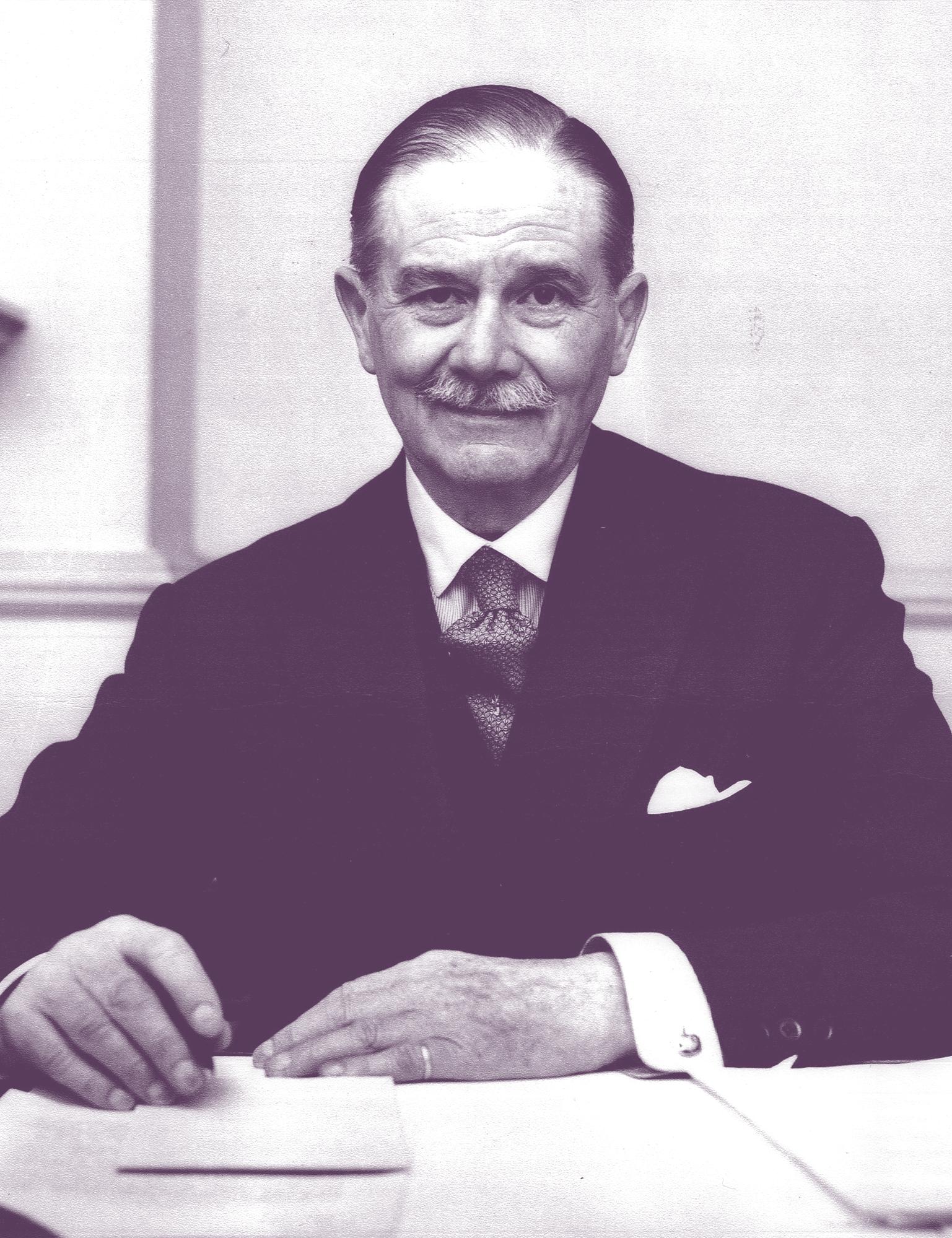
Esmée Fairbairn’s sons, Paul and Oliver Stobart, also contributed generously to the Foundation established in their mother’s memory.

In 1999 the Foundation sold its holding in M&G as part of the company’s takeover by the Prudential Corporation plc. As a result, the Foundation’s endowment grew significantly in value as did the size and scope of the grants it was able to make.
Today, Esmée Fairbairn Foundation is one of the largest independent funders in the UK.
Esmée Fairbairn Foundation

210 Pentonville Rd
London N1 9JY
020 7812 3700
info@Esméefairbairn.org.uk
@EsmeeFairbairn www.esmeefairbairn.org.uk
Registered charity 200051
Cover : Nature North
© Ellie Sherlock, Upper Tay Catchment Communities
© Perth and Kinross Countryside Trust, Marsh Frit
© Argyll and the Isles Coast and Countryside Trust, Odyssey
© Earta Johnson,
© Utopia Theatre,
© Repowering London, Farm walk
© Chloe Edwards,
© Northern Roots,
© Articulate Cultural Trust, Hen Harrier
© Andy Hay
Page 3 © Northern Roots
Page 12: © Repowering London
Page 15: People’s Plan for Nature
© WWF UK
Page 16: University of Derby Theatre
© Chris Wood, © Graeme
Braidwood
Page 19: © Utopia Theatre
Page 20: © Articulate Cultural Trust
Page 21: Company Three
© Simon Chue
Page 22: © The 4Front Project
Page 23: Odyssey © Earta Johnson
Page 24: Birth Companions
© Simon Rawles
Page 25: © Leap Sports Scotland
Page 26: © Citizens UK
Page 28: © Repowering London
Page 31: Bunker of Zion by John Pfumojena © JenFoto
Page 32: © AudioActive
Page 34: ©Theatr Clwyd, RIDE
(2022) – ZoieLogic Dance Theatre
© Cave & Sky
Page 35: © Northern Roots
Page 36: © Ulster Wildlife Trust
Page 38: Upper Tay Catchment
Communities © Perth and Kinross Countryside Trust
Page 39: Stock image
Page 40: Sustainable Food Trust
© Chloe Edwards
Page 41: © Argyll and the Isles Coast and Countryside Trust
Page 42: Nature North
© Ellie Sherlock, © Helena Dolby,
© David Morris, © Andy Hay
Page 47: © Museums Association
Design: Steers McGillan Eves